2 Examples Of The Gospel Law
A Summary Of The Teaching Video
Some of the points I cover in this teaching video:
In the previous study, I set forth the view that the believer is born again in order to walk with God according to the obedience and righteousness of Christ, under the authority of the covenant of grace (otherwise called, the covenant of redemption). By virtue of the soul’s union with Christ, the life and graces of Christ flow into the soul. The life of Christ makes the regenerate sinner alive unto God; the graces of Christ enable the sinner to bear the fruit of the new nature (love, joy, peace, longsuffering, patience, faith, humility, etc). The good works of a believer are nothing other than the graces of Christ expressing themselves in thought, word and deed. The obedience of a believer is nothing other than the believer working out with fear and trembling, those graces of Christ which the Spirit of God is working in him/her. In this way, both the obedience of the believer and the good works done by him/her are credited to Christ and to the Holy Spirit, that, according as it is written, “He that boasts, let him boast in the Lord.”
It is on this basis that the fallacious doctrine of progressive sanctification is denounced. Progressive sanctification is the view that a believer advances towards higher levels of holiness according to his/her obedience to a legal code (whether it be that of the heart law, the moral law or the mere precepts of the New Testament scriptures). However, holiness is a characteristic of the new nature, rather than a fruit. I wish to repeat, the new nature is the soul’s union with Christ. In Ephesians 4:24, the Apostle Paul refers to the new nature as “the new man, which after God is created in righteousness and true holiness.” Righteousness and true holiness are characteristics of the soul’s union with Christ. They are absolute characteristics, precluding any notion of progression or advancement. The nature is either righteous or unrighteous; holy or unholy. Degrees or measures of righteousness and/or holiness are impossible. Henceforth, while the believer may grow in the fruit of the new nature which flow into the soul by virtue of the soul’s union with Christ (Galatians 5:22-25), yet he/she cannot progress or advance to higher levels of holiness or righteousness, as these are the characteristics of the new nature (Ephesians 4:24).
In a nutshell, there are two natures residing in the soul, one created in unrighteousness and unholiness, the other created in righteousness and holiness. The old nature cannot be reformed or improved, neither can the new nature be impaired or corrupted. That which is born of the flesh is flesh (old nature); that which is born of the Spirit is spirit (new nature). The flesh (old nature) lusts against the spirit (new nature), and the spirit (new nature) lusts against the flesh (old nature). These natures are contrary the one to the other, so that the believer cannot do the things that he/she would. However, if a sinner is led of the spirit (new nature), then he/she is not under the law (legal code, whether it be the heart law, moral law or mere precepts of the New Testament). Among the fruit of the spirit (new nature) is love, joy, peace, longsuffering, gentleness, goodness, faith, meekness, temperance. Against the soul’s union with Christ there is no law (legal code). They that are Christ’s have crucified the flesh (old nature) with the affections and lusts. If, therefore, the believer lives in the spirit (new nature), let him/her also walk in the spirit (new nature). To walk in the spirit (new nature) is the gospel law. (See Galatians 5)
The sinner is born again in order to walk with God according to the obedience and righteousness of Christ, under the authority of the covenant of grace—for of God is he/she in Christ Jesus, who of God is made unto him/her wisdom, and righteousness, and sanctification, and redemption.
Jared Smith, Muntinlupa, PH (5/11/2022)
An Outline Of The Teaching Video
A Review Of The Framework Of Sovereign Grace
God’s Blueprint Of His Masterplan For The Ages
The Father’s Electing Love
A Time Continuum And A Purpose Built World
The Covenant Of Works—The Heart Law
The Two-Fold Problem Of Sin—Judicial Condemnation And Spiritual Corruption
The Reprobation Of The Non-elect
The Salvation Of The Elect
The Redeeming Grace Of God The Son
The Sanctifying Power Of God The Spirit
The Justifying Work Of Christ Answers The Problem Of Judicial Condemnation
The Sanctifying Work Of The Spirit Answers The Problem Of Spiritual Corruption
The Holy Spirit’s Work In Regeneration
The Imputation (Justification) And Impartation (Sanctification) Of The Righteousness Of Christ
The Covenant Of Grace Is The Gospel Of God
The Gospel Law Under The Covenant Of Grace
Tying Up The First Loose End—Once The Sinner Is Born Again, He/she Is Delivered From The Authority And Law Of The Covenant Of Works, And Is Brought Experientially Under The Authority And Law Of The Covenant Of Grace
Tying Up The Second Loose End—The Duties Belonging To The Unregenerate Under The Covenant Of Works Must Not Be Imposed Upon The Regenerate, Nor The Duties (Privileges) Belonging To The Regenerate Under The Covenant Of Grace Be Imposed Upon The Unregenerate
Some Biblical Examples Of The Gospel Law
The Law Of Christ—Galatians 6:2
The Law Of Union—John 15:5
The Perfect Law Of Liberty—James 1:25
Stand Fast Therefore In The Liberty Wherewith Christ Has Made You Free—Galatians 5:1
If We Live In Union With Christ, Let Us Walk In Union With Christ—Galatians 5:22-25
Beware Of Those Who Would Bring You Into Bondage, Under The Yoke Of Another Covenant And Its Law—Galatians 2:4,5
The Law Of Faith—Romans 3:27
The Law Of The Spirit Of Life In Christ—Romans 8:1-4
The Law Of God After The Inward Man—Romans 7:21-25
The Gospel Law Of The Covenant Of Grace—Romans 6:11-22
The Yoke Of Christ—Matthew 11:28-30
A Final Word
An Automated Transcript Of The Teaching Video
I’d like to welcome you back for another study in the Word of God. In our previous study, I tried to answer the question—What Is The Gospel Law? In a nutshell, I believe the gospel law is a living union—the living union of the soul with the Lord Jesus Christ. Now, at the close of last week’s study, I mentioned that I wanted to share with you some examples of the gospel law from the Bible, but I realized after I finish last week’s teaching, that I failed to tie together two loose ends. So, before we look at some examples, I’d like to review with you the diagram that I presented to you last time. I call it the Framework of Sovereign Grace. And if you’ll exercise a little bit of patience, I’ll go over once again the salient points of this diagram. I’ll lay out for you my view on the gospel law and then I’ll be able to tie together the two loose ends, which will lead us to consider some examples of the gospel law from the Word of God.
A Review Of The Framework Of Sovereign Grace
Well, looking at the on-screen notes, we have a diagram, or a framework, that looks something like this.
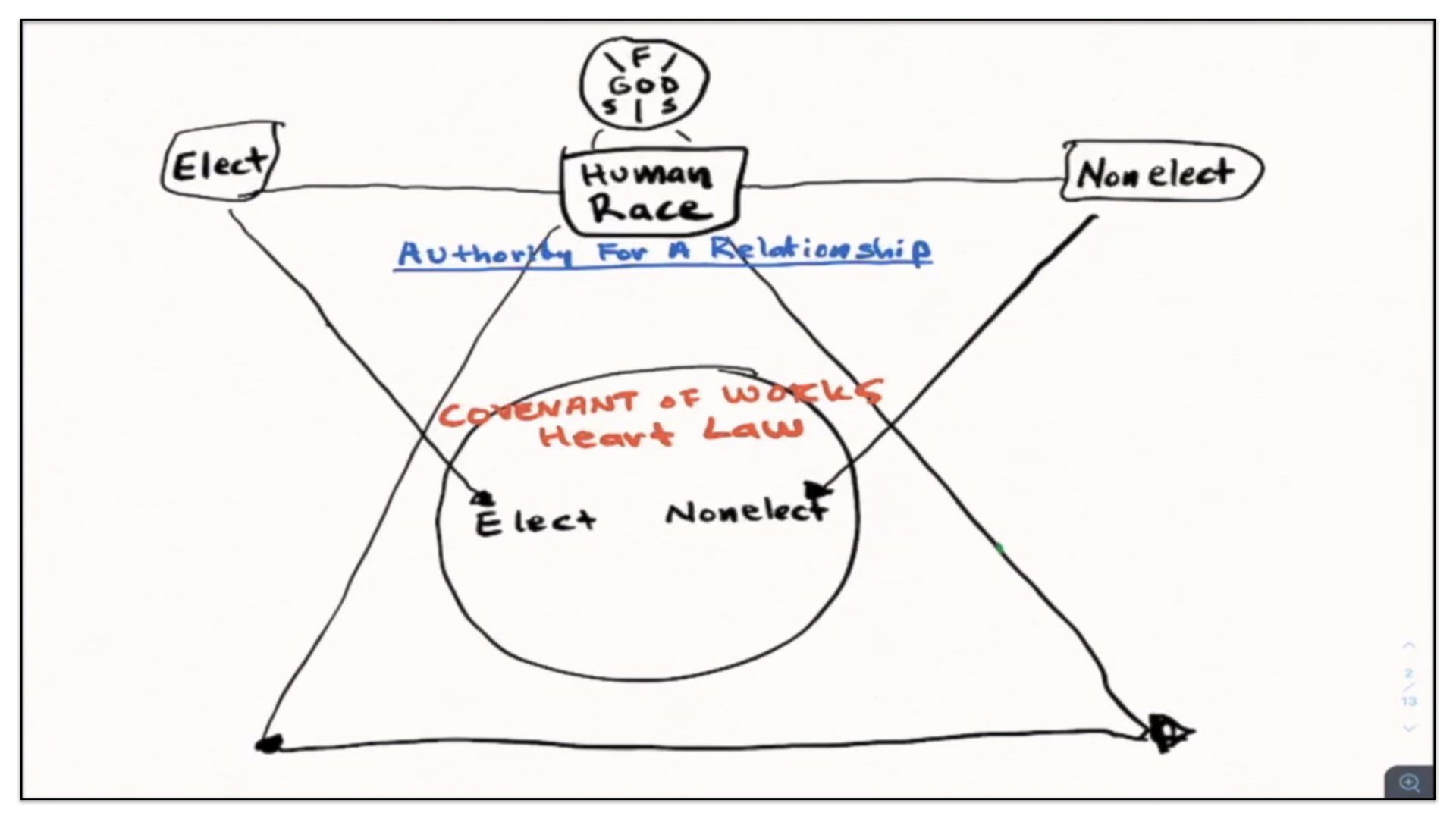
God’s Blueprint Of His Masterplan For The Ages
I went ahead and prepared the basics of the diagram and I’ll build on it from here. Just to remind you of what you see on the screen, it all begins with the Triune Jehovah, where God the Father, from eternity, with the Son and Spirit, drew up a blueprint for Their plan for the ages. It’s an eternal decree and everything I’m presenting to you on this chart can be viewed as a blueprint—something that has not yet come into existence or come to pass in time; but something that God is decreeing, ordaining, purposing or planning from eternity. It’s the framework or the blueprint of all that God will do.
The Father’s Electing Love
So, the first thing the Father did from eternity, according to this eternal decree, is to envision the entire human race, setting apart some as objects of special love. They’re called His elect people. And then, setting aside the others as objects of less love. And we identify them as the non-elect, or the reprobate.
A Time Continuum And A Purpose Built World
Having made this choice, the Father then determined how He would bring the human race into existence. It would be in a time continuum—that’s the timeline you see at the bottom of the diagram. And it would be in a purpose-built world—the circle you see in the middle of the diagram. And it would be in this world that God would bring both the elect and the non-elect to live.
The Covenant Of Works—The Heart Law
We then have in blue text the words “Authority for a Relationship”. You’ll remember that is the meaning, or significance, of a covenant. Now, let me depart from the diagram for just a moment and I’ll remind you. I gave a little explanation to you on the meaning and significance of a covenant and just to review that—a covenant is an agreement between two or more persons, with certain obligations binding them together.
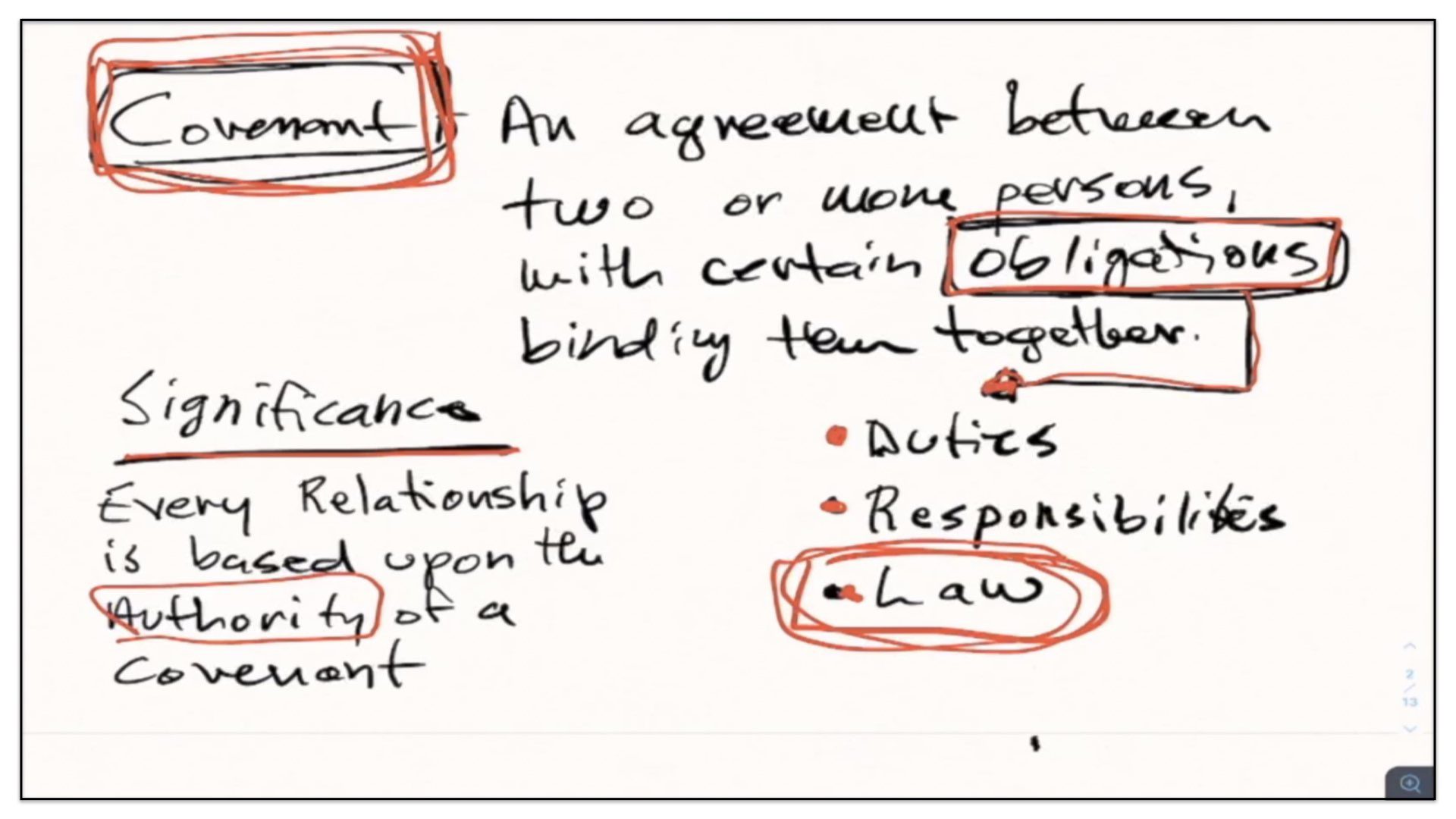
This word obligations refers to duties, responsibilities or laws. And I pointed out to you last time that every law belongs under the jurisdiction or authority of a covenant. Where there is a law there is also a covenant, and where there is a covenant there is also a law. I then highlighted for you the significance of a covenant. The significance of a covenant—every relationship is based upon the authority of a covenant. Every relationship! There cannot be a relationship without an agreement between those two or more persons and within that agreement are obligations, duties, responsibilities, laws, expectations that each person within that agreement are expected to fulfill. A transgression of those duties or laws leads to relational conflict and that is a violation of the agreement or covenant that binds those people together.

So, with that in mind, coming back to the diagram, the “Authority for a Relationship” with God is based on a covenant. So, God chose to establish something called a covenant of works with Adam and this covenant of works has a law. I call it the heart law, because it’s a law that God inscribed upon the heart of Adam. It’s a two-fold law— first, to love God supremely, and second, to love one’s neighbor as him or herself. That same law was inscribed upon the heart of Eve and all of us that come into this world. All of us have this law inscribed upon our hearts and God commands that we perfectly obey that law. That is part of the terms of the covenant of works.
The Two-Fold Problem Of Sin—Judicial Condemnation And Spiritual Corruption
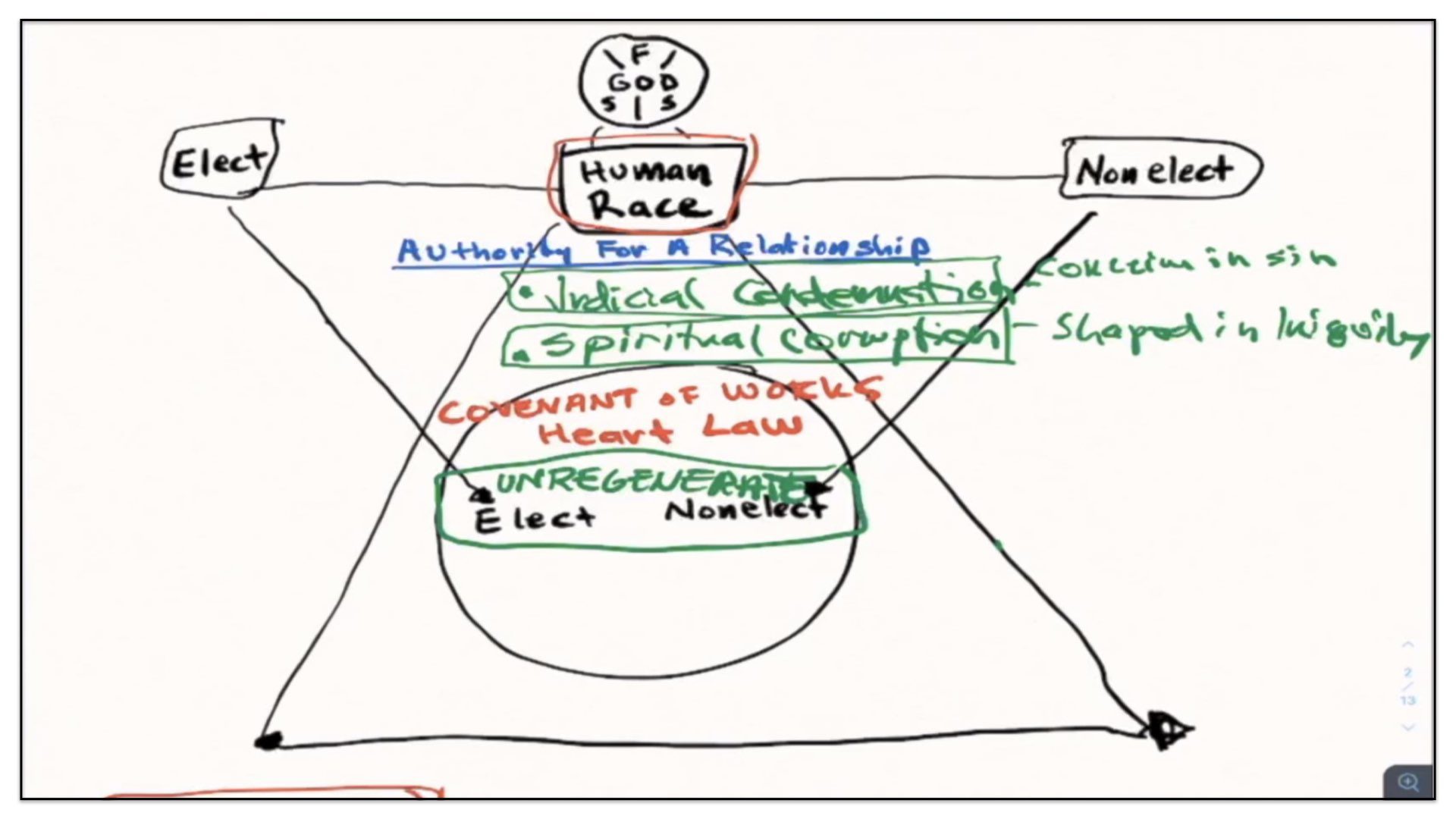
Well, of course, Adam was also appointed the covenant head for the entire human race. And we know what happened to Adam. He chose to transgress the law inscribed upon his heart and in doing so, he brought upon himself two consequences: First, judicial condemnation, and Second, spiritual corruption. Now, when King David wrote Psalm 51, he referred to this. It’s all about original sin and David spoke of being conceived in sin and shaped in iniquity. And that’s the meaning of those two expressions—to be conceived in sin means that we, by virtue of Adam’s headship, are under a judicial condemnation. We’re conceived in sin. And, by virtue of Adam’s headship, we are also spiritually corrupt, or shaped in iniquity. Our souls are corrupted with sin. And that’s the doctrine of total depravity. Now, this brings the entire human race into sin—those that come through Adam’s seed. And this means that everyone as a result of sin is in an unregenerate condition, both the elect and the non-elect. Now, that’s the problem of sin.
The Reprobation Of The Non-elect
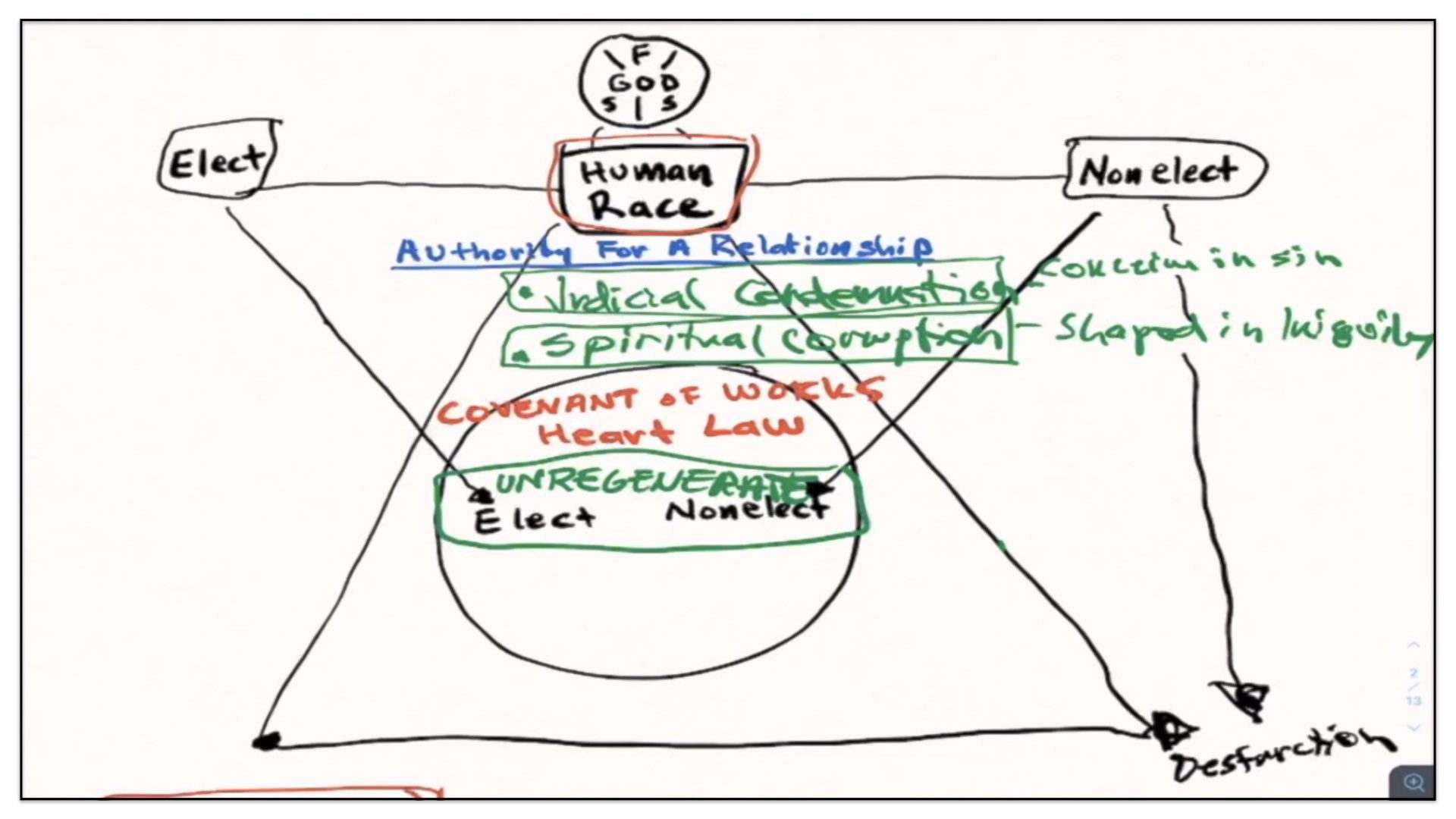
Well, having made this determination that this is how things would proceed in God’s masterplan for the ages, it pleased God to leave the non-elect in their sins, fitting them to destruction.
The Salvation Of The Elect
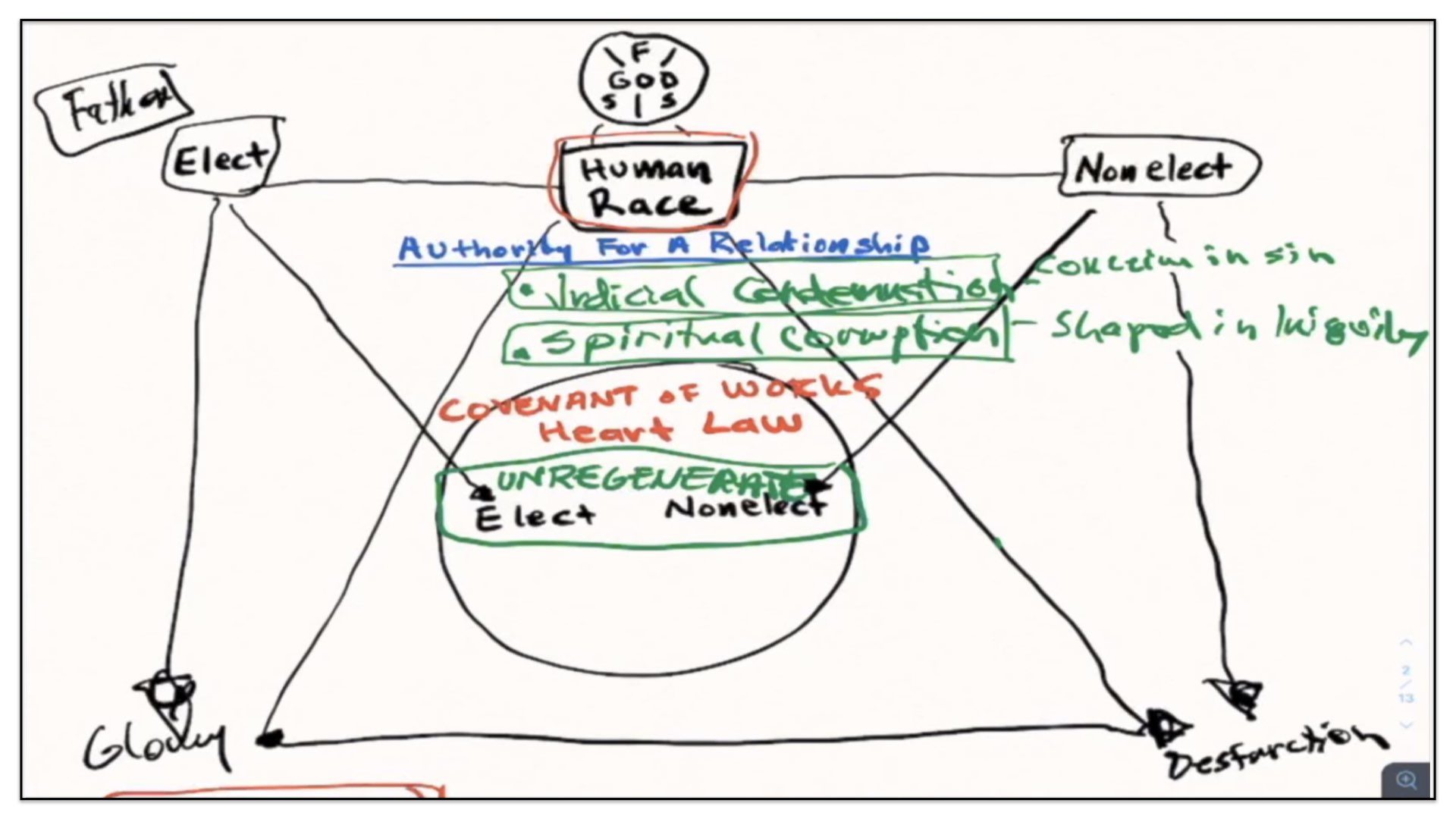
However, because God the Father had already set His everlasting love upon the elect, He devised a plan of salvation, preparing them to Glory.
The Redeeming Grace Of God The Son
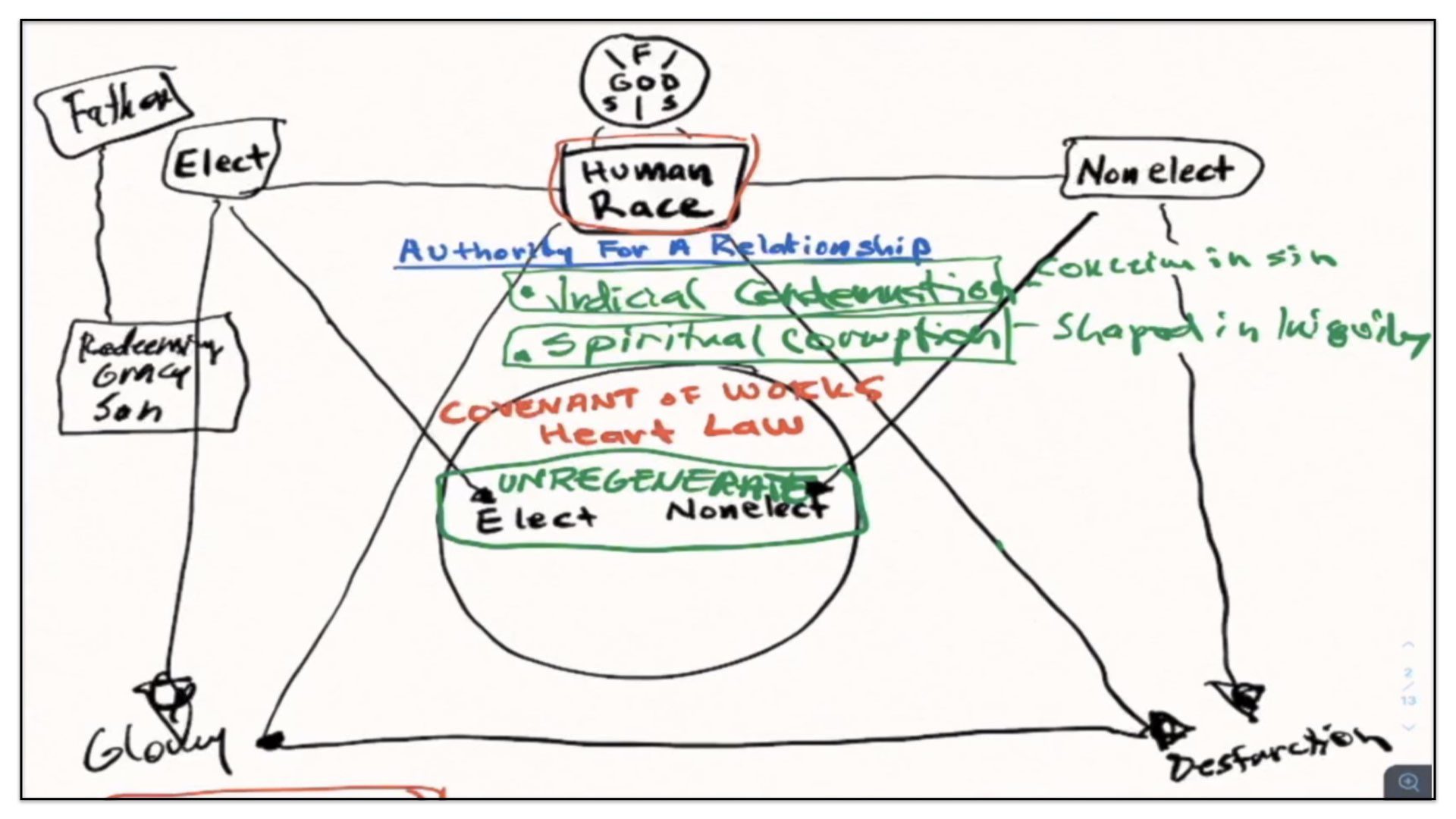
The first part of the Father’s plan was to give the elect into the special care of His Son, appointing His Son to serve as their Redeemer. And we call this, therefore, the redeeming grace of God the Son.
The Sanctifying Power Of God The Spirit
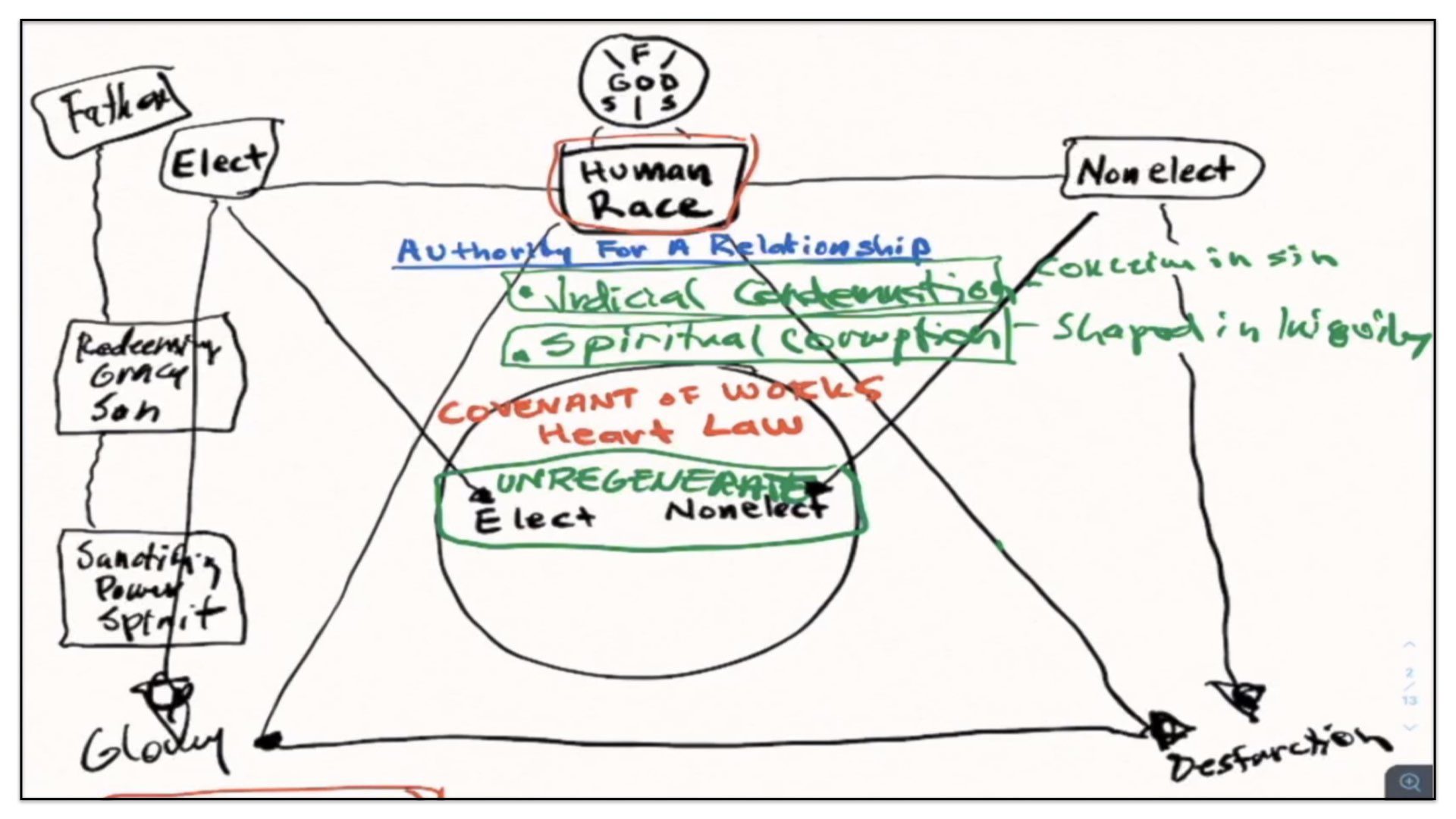
And then the Father and Son gave the elect to the Holy Spirit, appointing the Spirit of God to serve as their Sanctifier. We call this the sanctifying power of the Holy Spirit.
The Justifying Work Of Christ Answers The Problem Of Judicial Condemnation
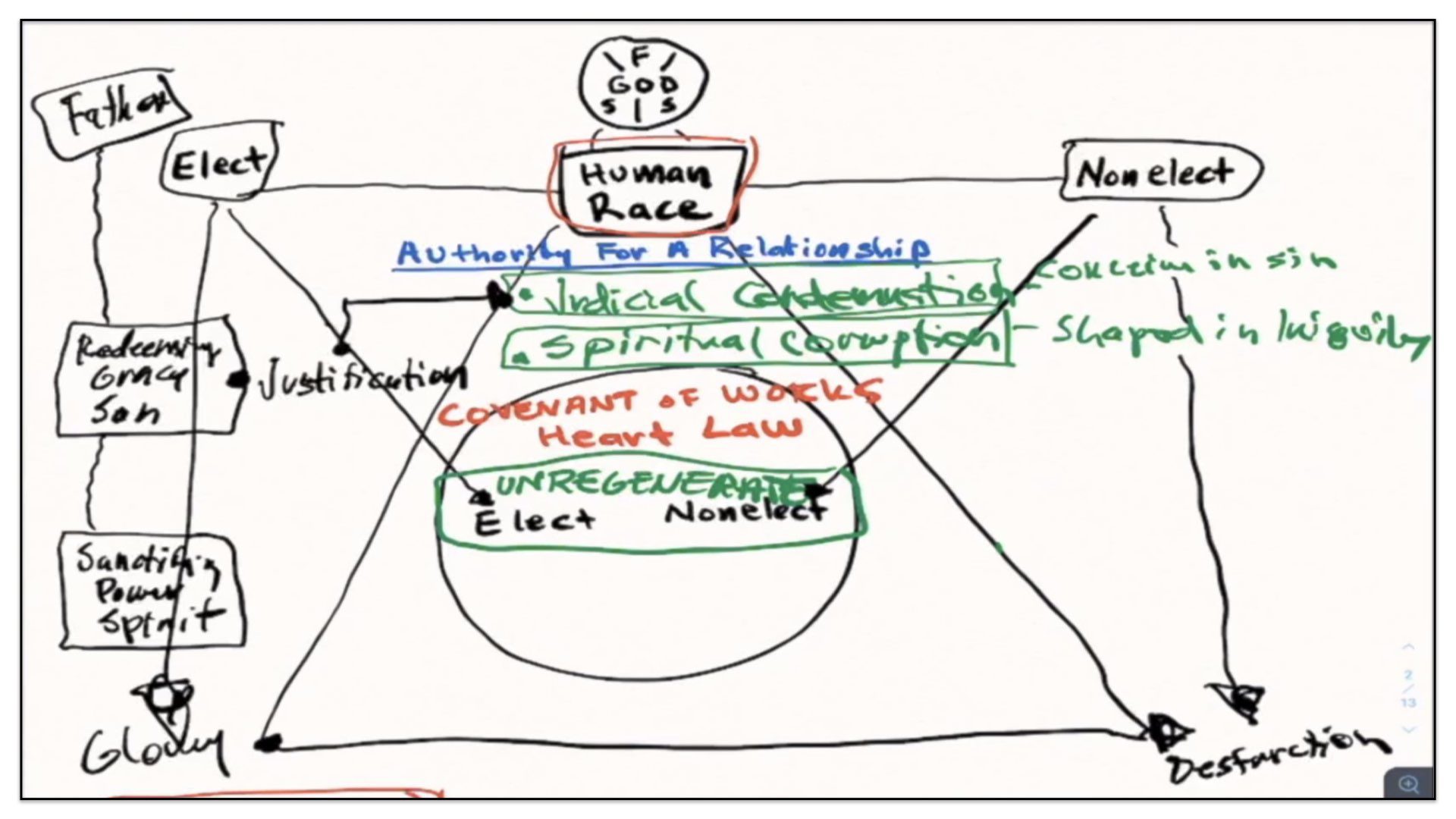
And you see, it’s in these two ways that God the Father has devised the plan of salvation to save His people from their sins. When God the Son redeems His people, the Father justifies them through that redemption. We call it justification, and the doctrine of justification answers the problem of judicial condemnation.
The Sanctifying Work Of The Spirit Answers The Problem Of Spiritual Corruption
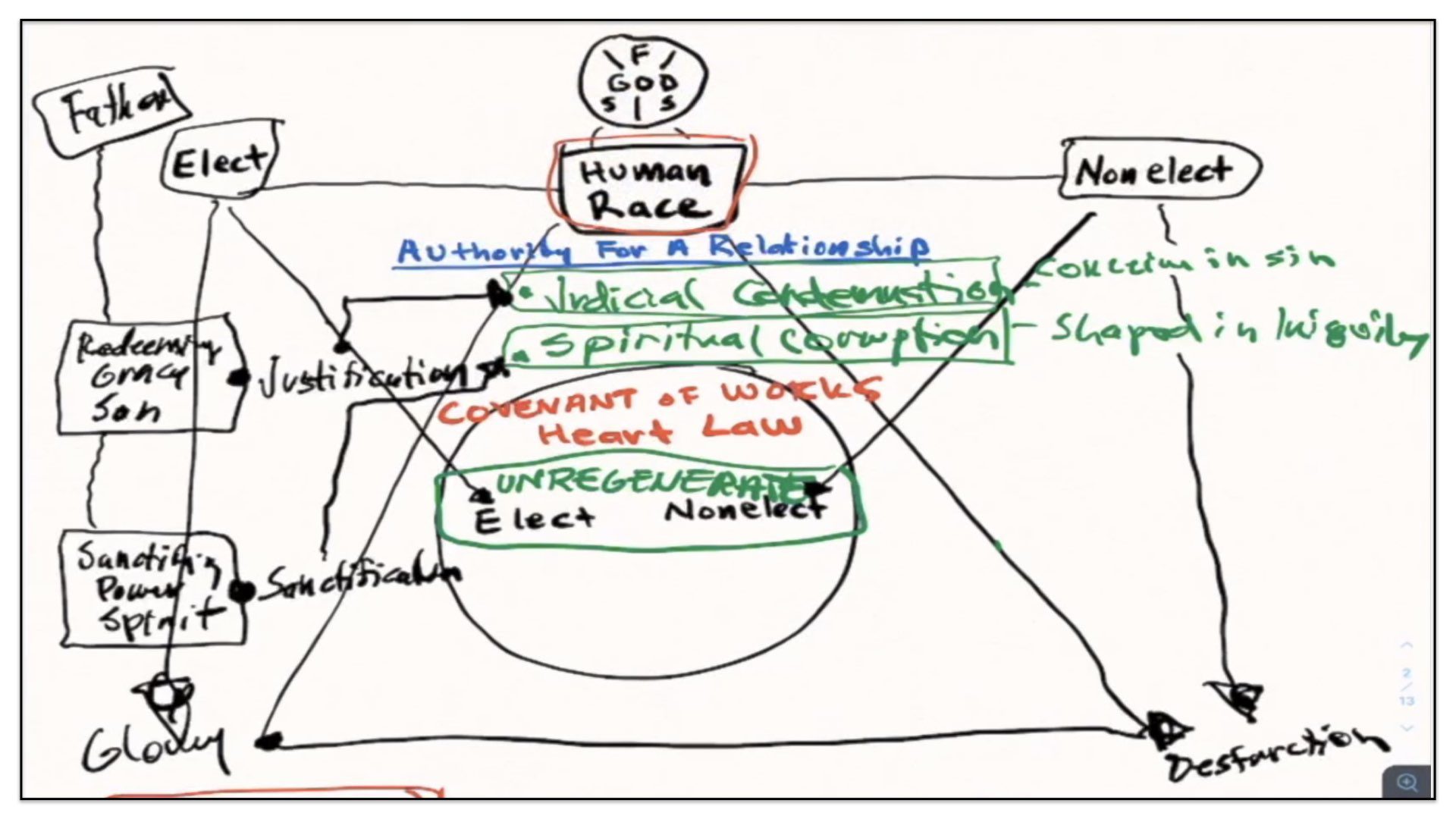
And then, when the Holy Spirit sanctifies God’s elect people, this is what’s called sanctification, and this answers the second problem of sin, spiritual corruption. How can the soul be made righteous when it’s corrupted with sin? And the answer to that is regeneration, which comes under the broad canopy, or umbrella, of the sanctifying power of the Holy Spirit.
The Holy Spirit’s Work In Regeneration
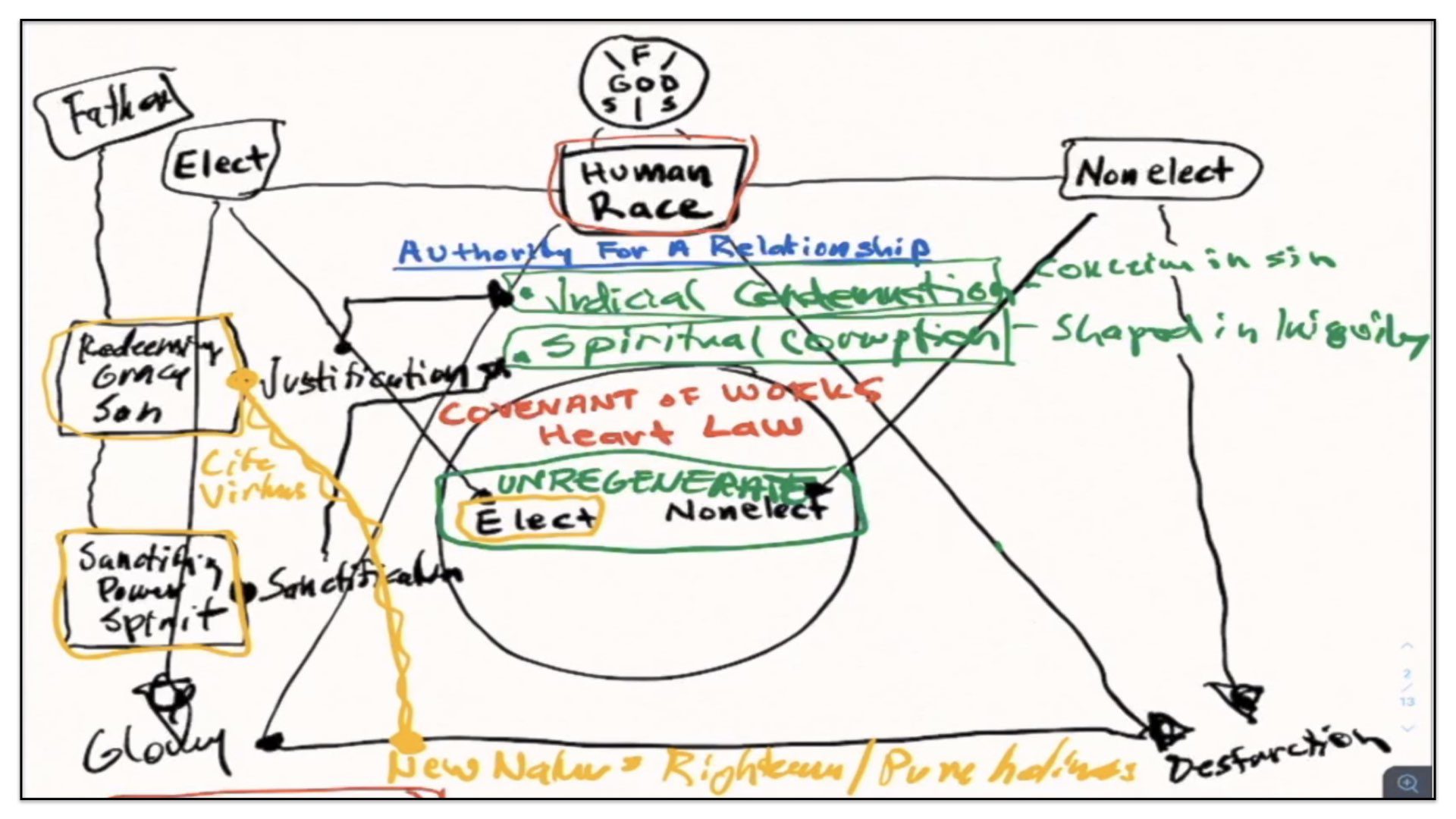
You’ll remember what happens to a sinner when he or she is born again, and it only happens to God’s elect people. The Spirit of God, at the appointed time throughout the course of history, will unite the soul of all of those the Father has chosen and the Son has redeemed—the Spirit of God will unite that soul with the Lord Jesus Christ. The life of Christ will flow into the soul, making that Soul alive unto God through the Lord Jesus. And, the virtues of Christ will also flow into the soul—virtues such as the love of Christ and the joy of Christ and the peace of Christ and the humility of Christ and the faith of Christ—all of that flows into the soul and those become the fruit of this union with Christ. This union with Christ is called a new nature. And you see, the new nature we’re told is created in righteousness and true holiness. That’s the characteristics of the new nature. And that’s how the soul is made righteous in Christ. It’s because of one’s union with the Lord Jesus.
The Imputation (Justification) And Impartation (Sanctification) Of The Righteousness Of Christ

And so, in essence, what we have here is the obedience and righteousness of Christ imputed to God’s people, which is justification. And also the obedience and righteousness of Christ is imparted to God’s people spiritually, which is what we call sanctification or regeneration. You see, the obedience and righteousness of Christ is true for both justification and sanctification. We not only stand in the obedience and righteousness of Christ as justified sinners, but we also walk in the obedience and righteousness of Christ in our sanctification. So it’s always the obedience and righteousness of Christ in which we stand and walk.
Those who believe that a sinner is born again in order to exercise his or her own obedience and works of righteousness are actually denying the very heart of the gospel of Christ. They’re replacing the obedience and righteousness of Christ with their own obedience and righteousness. That is not how one is sanctified, my dear friends. It’s not based on my obedience after I’m born again. No, it’s based on the obedience and righteousness of Christ. It’s the same for justification as it is for sanctification.
The Covenant Of Grace Is The Gospel Of God
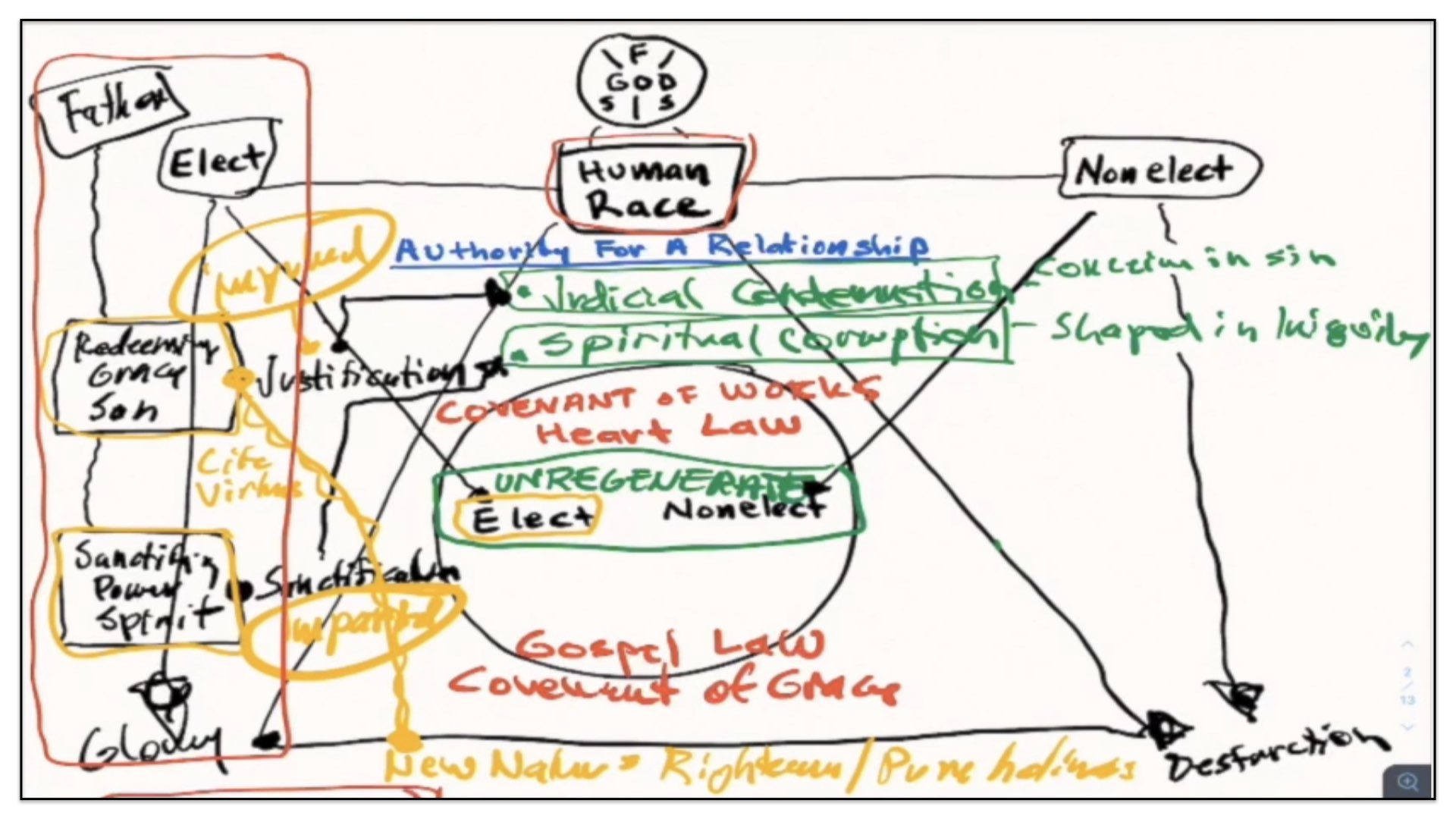
And you see, what I’ve been pointing out to you, all of this is called the covenant of grace. The covenant of grace is the gospel of God. It is none other than God’s plan of salvation. The Father’s plan of Salvation, through the redeeming grace of the Son, whereby God’s people are justified, and the sanctifying power of the Spirit, whereby God’s people are regenerated. And under the covenant of grace is a law. Remember every covenant has a law. And this is what I call the gospel law.
The Gospel Law Under The Covenant Of Grace
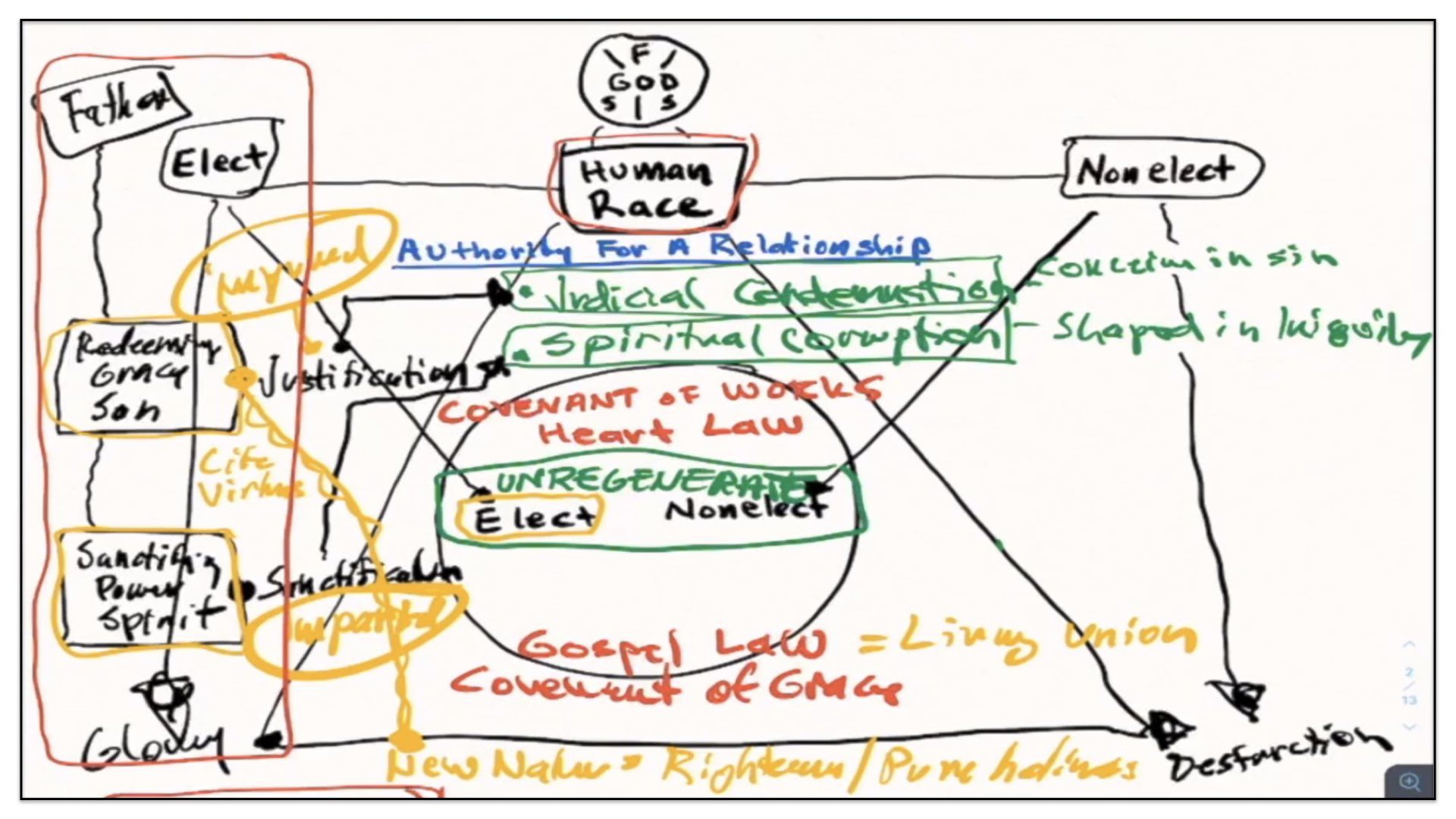
Now, there is a heart law under the covenant of works. And there’s a gospel law under the covenant of grace. What exactly is the gospel law? As I’ve said at the beginning, it is the living union between us and Christ where the virtues of Christ flow through us. And they’re then expressed in our thoughts, our words, our actions, all of our good works. Or, all of our obedience as God’s people is nothing other than the expressions of Christ’s virtues flowing through us. I hope you see that. Even when we are obedient as believers in Christ, it’s not our obedience. It’s still the virtues of Christ flowing in us, which is given expression through good works or through obedience. All of it links back to the Lord Jesus Christ and ultimately His obedience, His righteousness.
Tying Up The First Loose End—Once The Sinner Is Born Again, He/she Is Delivered From The Authority And Law Of The Covenant Of Works, And Is Brought Experientially Under The Authority And Law Of The Covenant Of Grace
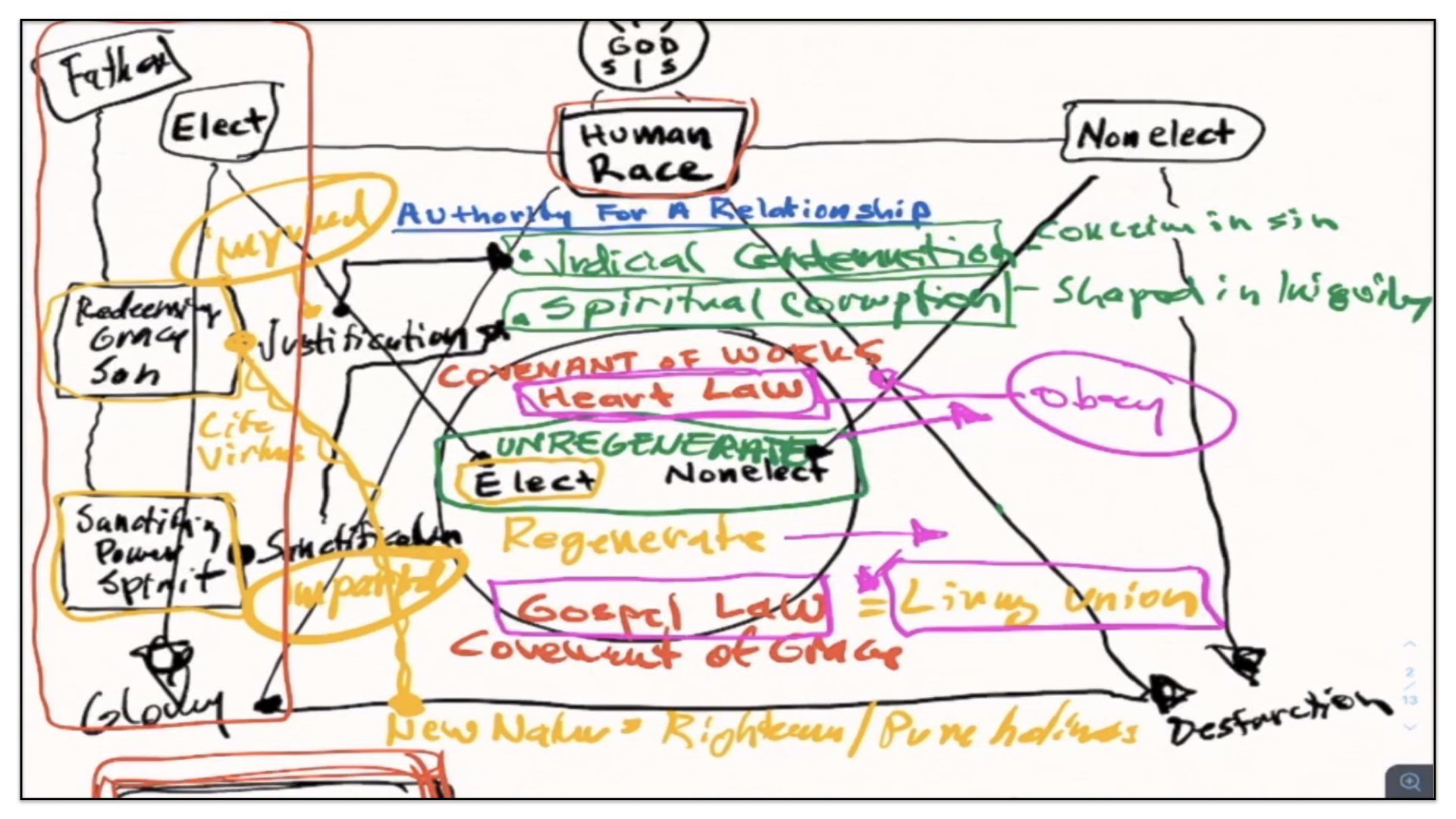
Now, that’s what I presented to you last week. Let me show you the two loose strings that I fail to tie together. watch. Let me mark down here one more word—the regenerate. Watch this. Let me change color pin so I can highlight the loose ends. Watch. Every unregenerate sinner is under the authority of the covenant of works; whereas every regenerate sinner is under the authority of the covenant of grace. Think of that! Every unregenerate sinner, because he or she is under the authority of the covenant of works, is responsible before God to obey or keep the heart law—to love God supremely; to love one’s neighbor as him or herself. Whereas, because every regenerate sinner is under the authority of the covenant of grace, then he or she is responsible before God under the gospel law. What is the duty of a believer in Christ? Is it to keep the heart law? No. It’s to keep that living union with Christ. To bear the fruit of the spirit. To walk in newness of life. To walk in one’s new nature, given to him as a result of the union he has with Christ, or she has with Christ. Watch this. The Lord Jesus Christ, when He came into this world, we speak of His obedience and righteousness. To what was He obedient? Don’t you know, my dear friends, the Lord Jesus Christ was perfectly obedient to the heart law? The Lord Jesus Christ perfectly obeyed the heart law. He fulfilled in righteousness for us what we cannot do for ourselves. Don’t you therefore see the folly, that if you have been born again, you think it’s still your duty to obey the heart law? What then is the obedience of Christ all about for you, my friend? If you’re born again, has not the Lord Jesus Christ perfectly obeyed the heart law and earned that righteousness for you? What therefore is there left for you to do according to the heart law, what Christ Himself has completely accomplished? I hope you see, that those who will tell you that you’re born again in order to walk with God according to your obedience to the heart law or to a moral law, they are actually undermining the obedience and righteousness of Christ, which in effect is a denial of the gospel of God. Now look, if you read Paul’s epistle to the Galatians, that’s precisely what he was driving at. He had to withstand Peter to the face because Peter was making this error. It’s an error all too easy for all of us to make in our pilgrimage with the Lord.
Tying Up The Second Loose End—The Duties Belonging To The Unregenerate Under The Covenant Of Works Must Not Be Imposed Upon The Regenerate, Nor The Duties (Privileges) Belonging To The Regenerate Under The Covenant Of Grace Be Imposed Upon The Unregenerate
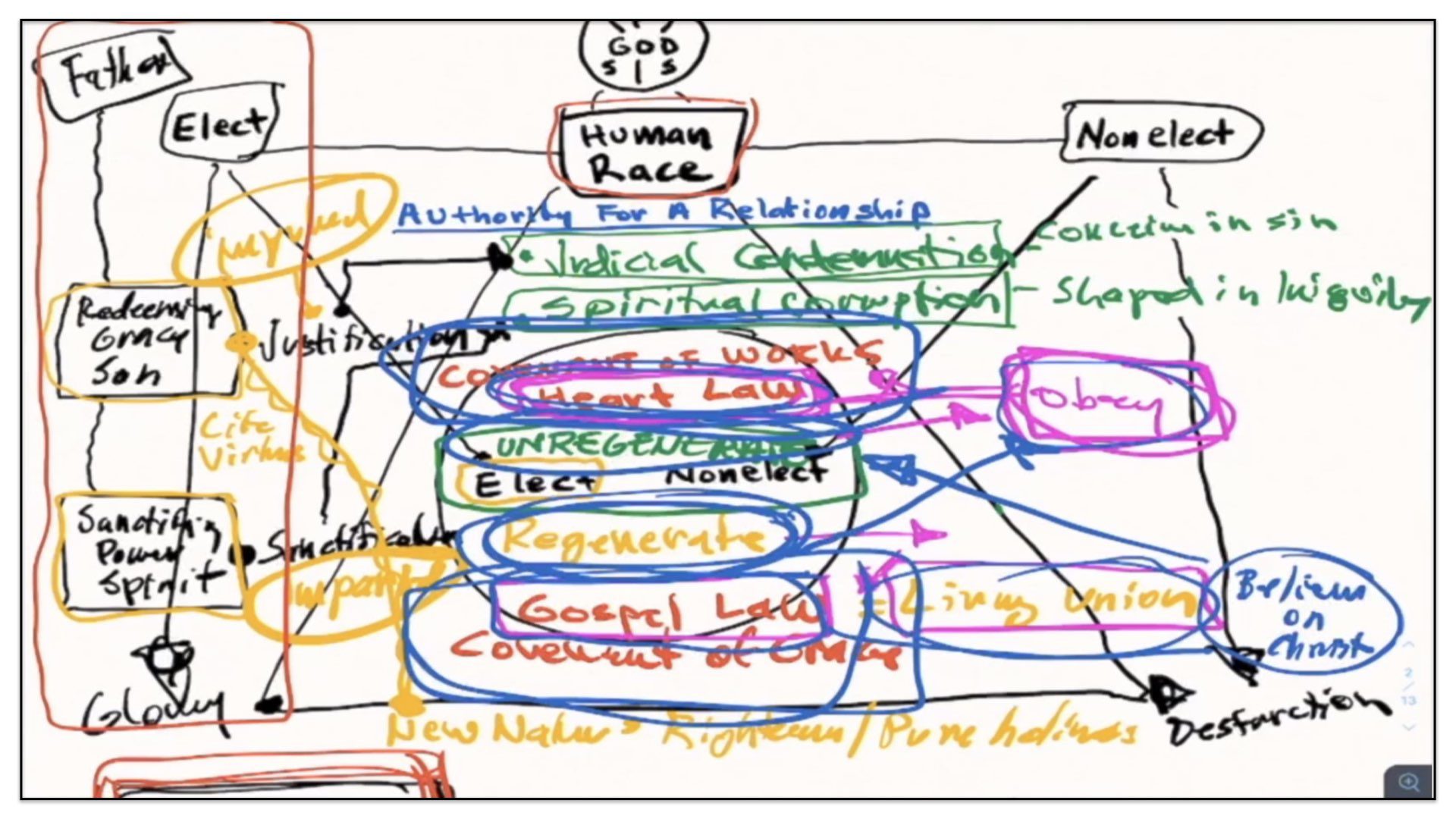
Now watch what happens. This is my final thing in tying up these loose ends. Watch what happens. In these Reformed or Arminian circles, they will take the obligations belonging to God’s regenerate people. What would that be? To believe on the Lord Jesus Christ to the saving of the soul. They take this obligation which belongs to the regenerate and what did they do? They say to the unregenerate, “That is what you must do.” But you see, the unregenerate has not been regenerated yet. They’re not under the covenant of grace by experience. They’re still under the covenant of works. It’s not the unregenerate’s responsibility to savingly believe on Christ. What is the responsibility of an unregenerate sinner? The responsibility of an unregenerate sinner is to perfectly keep the heart law. And then, watch what else these people will do—these Reformed people or Arminians. They’ll then say to the regenerate, they’ll say, “Look, it’s your job to obey the heart law now that you’ve been born again.” What? No! Having been born again, they are now privileged to believe savingly on the Lord Jesus Christ; to be in union with the Lord Jesus Christ. It’s not the regenerate’s job to obey that which he is no longer under. You see, my dear friends, we are not under two covenants at the same time. That’s the big mistake that’s made here. It’s the assumption that somehow all of us are under the covenant of works and the covenant of grace simultaneously. It’s not true. If you’re an unregenerate sinner, you’re under one covenant only and it’s the covenant of works, and God holds you accountable under the terms of that covenant. If you’re a regenerate sinner, then you’re now experientially under the covenant of grace, and now God invites you and brings you to Christ where it’s your privilege to savingly believe on Him. I hope you can see that! These are the loose ends I failed to tie up properly. Before it’s a criss-crossing—a criss-crossing of duties and responsibilities. Oh, listen, there’s those that will say God is sovereign and man is responsible, and those Hyper-Calvinists deny the responsibility of man, when they magnify the sovereignty of God. Listen, those people don’t know what they’re talking about. I’m a Hyper-Calvinist and I do not deny the responsibility of man. I define the responsibility of man! We’re all responsible. But our responsibility comes under the jurisdiction of a covenant. And it’s either the covenant of works or the covenant of grace. That’s what a hyper-calvinist is—it’s one who rightly defines the jurisdiction under which a sinner is in relationship either to God or with God. Okay. Well, that’s what I want to share with you in tying up those loose ends.
Some Biblical Examples Of The Gospel Law
Let’s take the remainder of the time we have and I’d like to share with you some examples of the gospel law as it appears in the Bible. I don’t have the time to go into much explanation of these passages of scriptures. So I’ll read them to you, make a few comments here and there, but I just want to get through the list of them and really leave it to you, in your own time, to take the teachings I presented in the last couple of studies and compare these scriptures with the viewpoint that I’ve set out according to the Framework of Sovereign Grace. Okay.
The Law Of Christ—Galatians 6:2
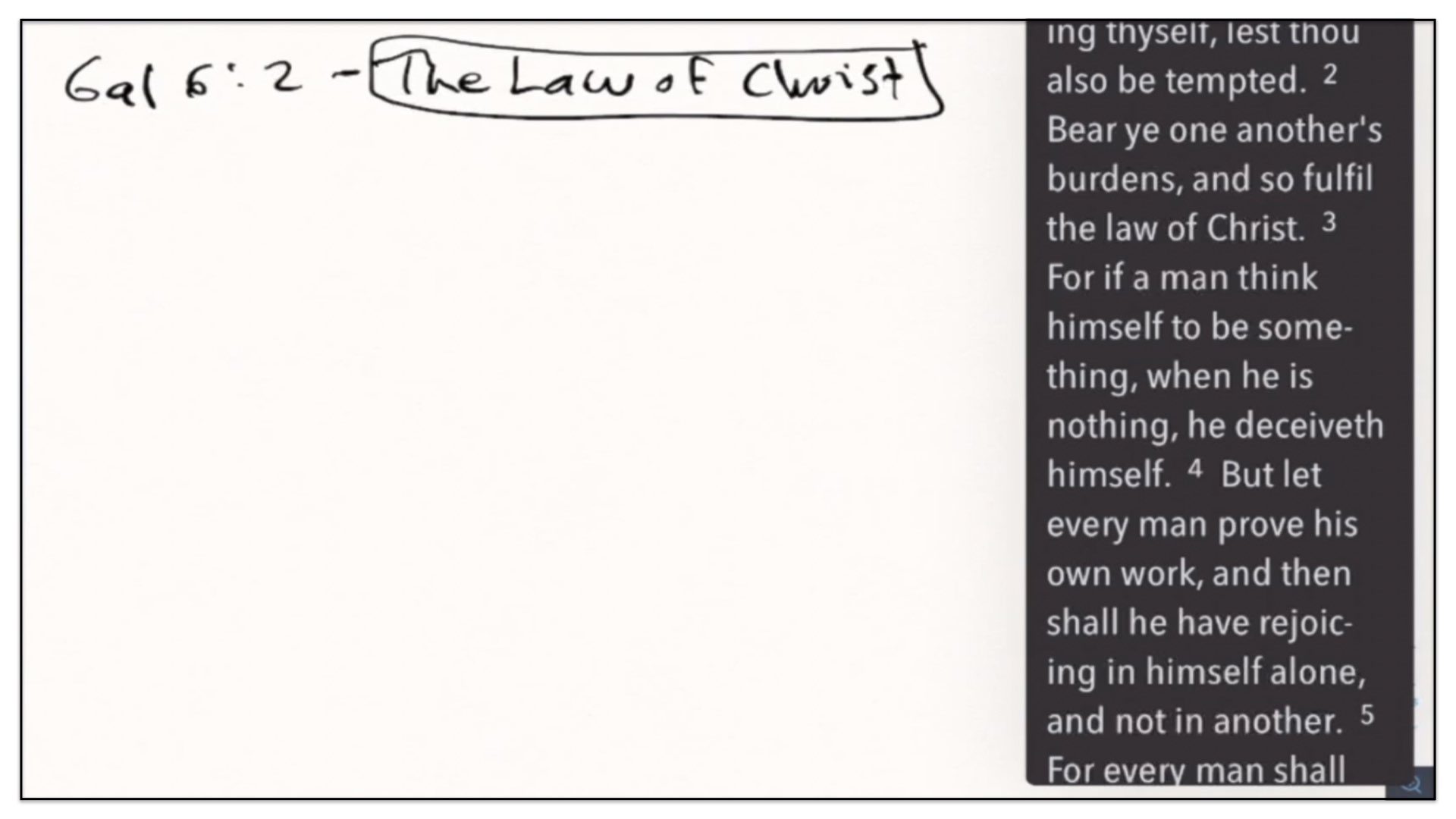
The first of these scriptures is going to be Galatians chapter 6 and verse 2. That’s a passage of scripture we looked at last time. Let me begin reading in verse 1—“Brethren, if a man be overtaken in a fault, ye which are spiritual, restore such an one in the spirit of meekness; considering thyself, lest thou also be tempted. Bear ye one another’s burdens, and so fulfil the law of Christ.” You’ll notice, it’s called “the law of Christ” here. That’s what I believe to be another name for the gospel law, or this living union that we have with the Lord Jesus Christ—the law of Christ. I won’t make any further comments about that passage, but there is another one I’d like you to turn to and this is John chapter 15 and verse 5.
The Law Of Union—John 15:5
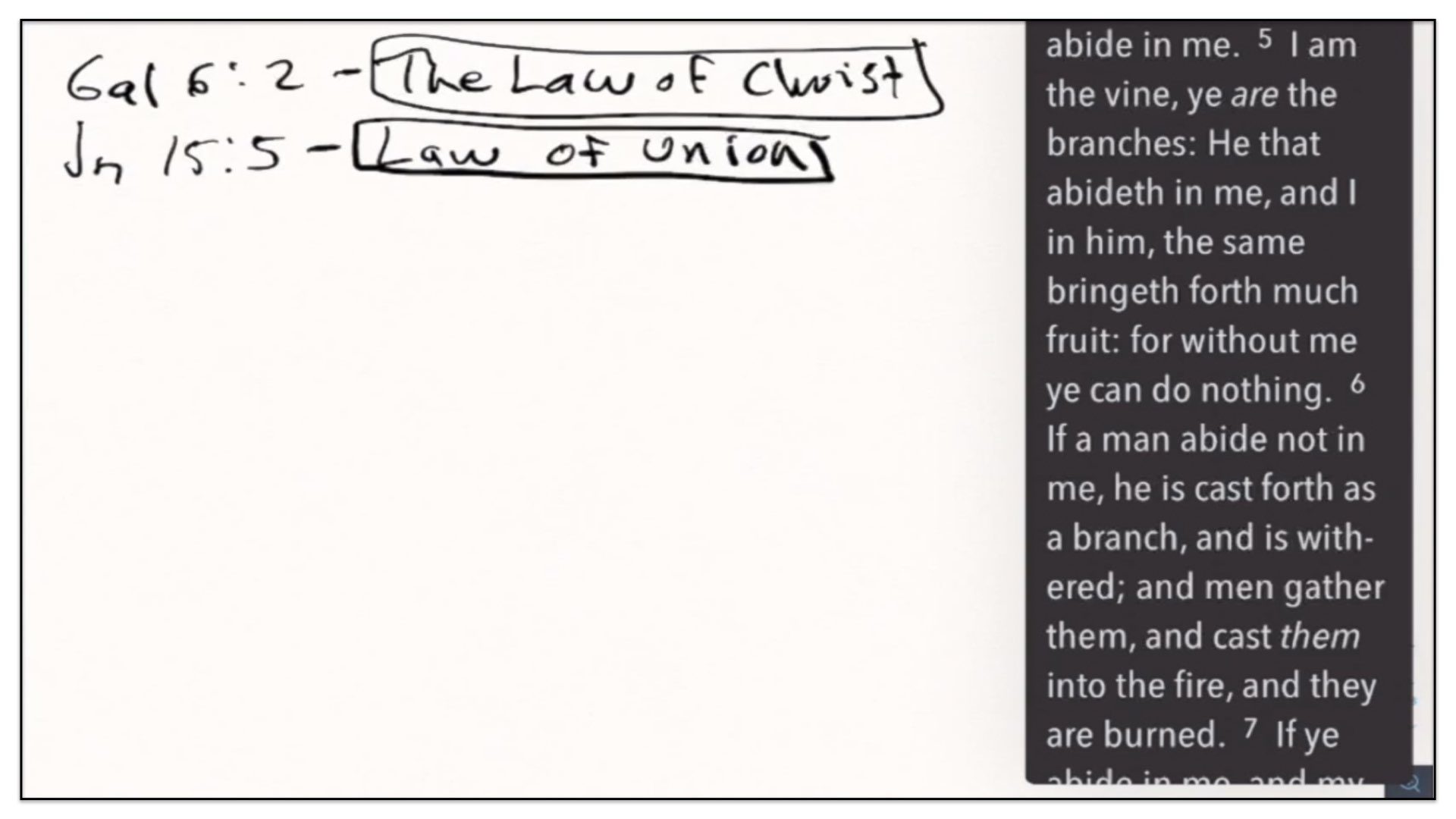
John chapter 15 and verse 5. Now, these passages I read for you, I encourage you to read them in their broader context. I only have the time to highlight the particular words that I want you to see with reference to the different names given to the gospel law. In verse number five—Jesus said, “I am the vine, ye are the branches: he that abideth in me, and I in him, the same bringeth forth much fruit: for without me ye can do nothing.” Now, you’re not gonna find the label in this verse, but I am going to label it. I’m going to call this the law of union. I believe that’s what Jesus is teaching here. Jesus describes himself as the Vine, and the elect sinner is the branch. The branch is dead in trespasses and sins and in an unregenerate condition, but then, when regenerated by the Spirit of God engrafts that dead branch to the vine of Christ, whereby the life of the vine, or the life of Christ, flows into the branch, or flows into the soul of the sinner, thereby, that sinner becoming alive unto God through the Lord Jesus Christ. And not just life, but virtue. Depending on the nature—let’s say it’s a grapevine—then that branch is also going to receive the virtue of that vine (the grapevine) and it will eventually bear grapes, the fruit. So also will the believer who is engrafted to Christ, or united to Christ spiritually, will bring forth the fruit or virtues of Christ, among which is saving faith, meekness, temperance, long-suffering, etc. This is the law of union. This is the gospel law. This is the law of Christ.
The Perfect Law Of Liberty—James 1:25
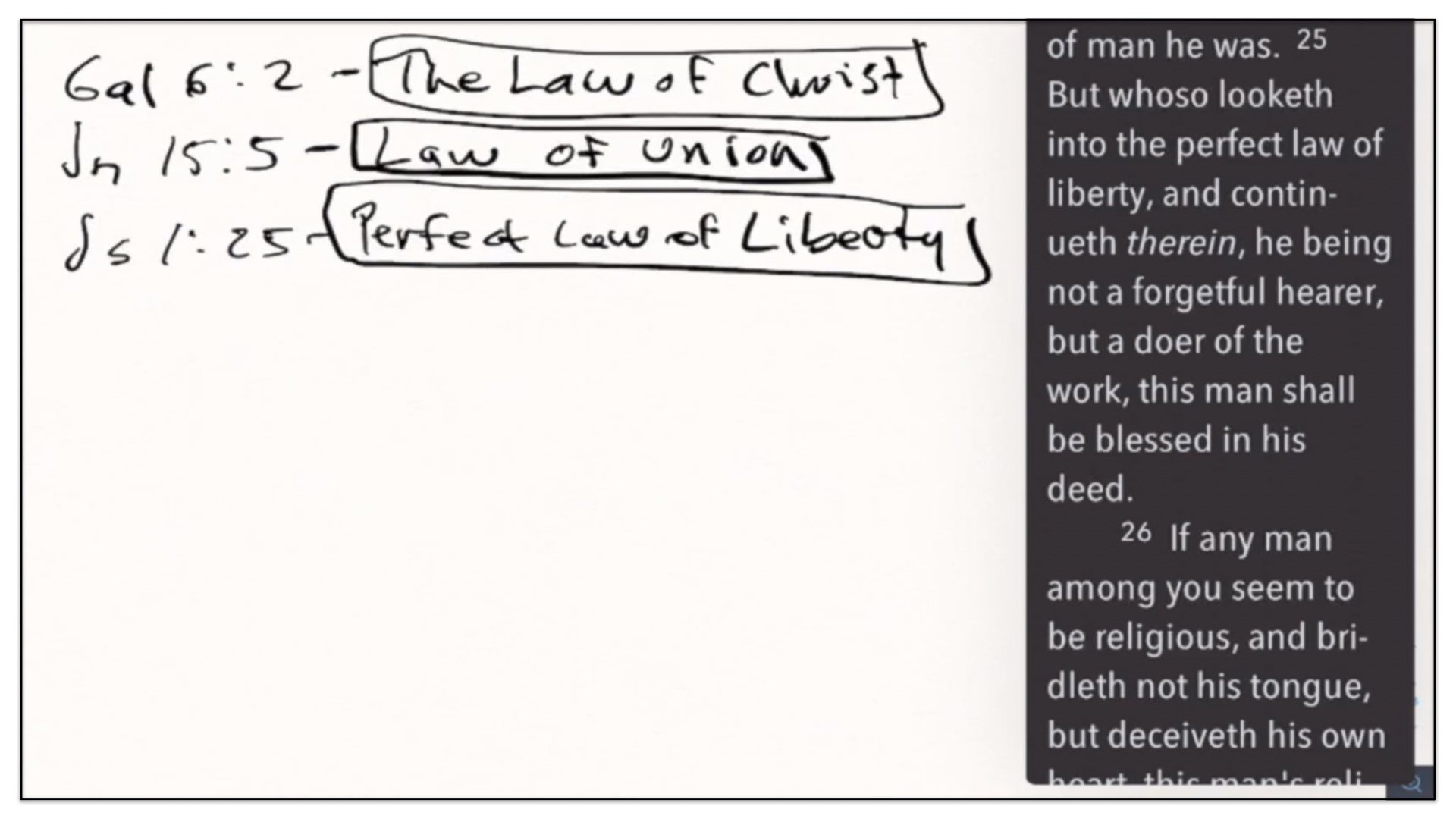
Here’s another passage of scripture I’d like us to consider. This is James chapter 1 and verse 25. James chapter 1 and verse 25—“But whoso looketh into the perfect law of liberty, and continueth therein, he being not a forgetful hearer, but a doer of the work, this man shall be blessed in his deed.” To look into the perfect law of liberty, that’s what we’re gonna mark down here. It’s called “the perfect law of liberty”. Many people interpret this to be the Word of God, the written Word of God. I interpret this to be the living Word of God, with whom we are united—the spiritual union, our union with Christ. On this point of the gospel law being described as a law of liberty, the Apostle Paul has a lot to say about the gospel law in connection to it being one of liberty in his epistle to the churches of Galatia. And that’s going to be the next passage.
Stand Fast Therefore In The Liberty Wherewith Christ Has Made You Free—Galatians 5:1
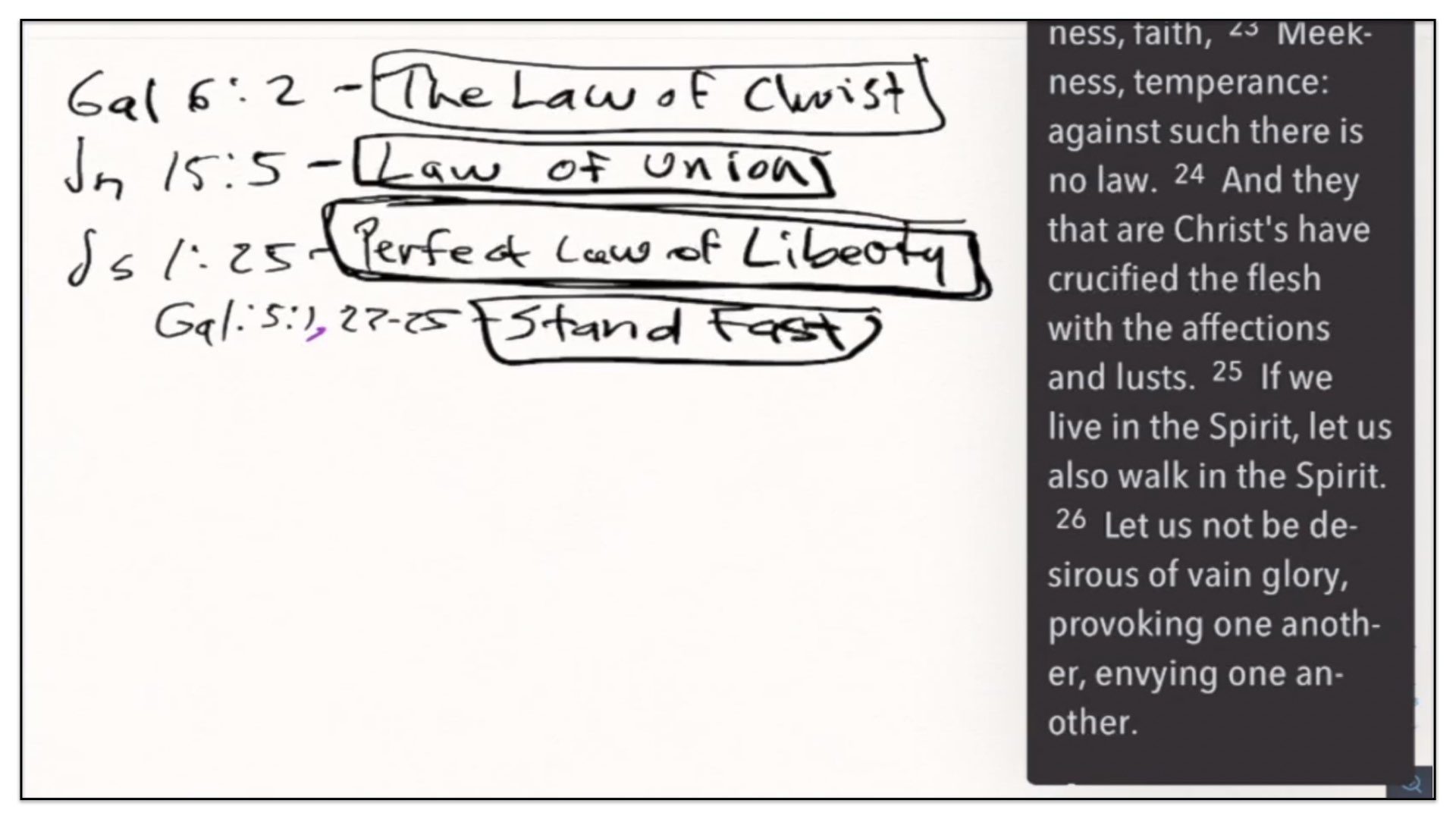
I ask you to turn to Galatians chapter 5 and I’m just going to put this passage under James chapter 1. In Galatians chapter 5, I want to read first verse 1. The Apostle Paul writes, “Stand fast therefore in the liberty,” here’s the perfect law of liberty, the gospel of Christ, the law of Christ, the law of union. “Stand fast therefore in the liberty wherewith Christ hath made us free, and be not entangled again with the yoke of bondage.” Look back at our framework.
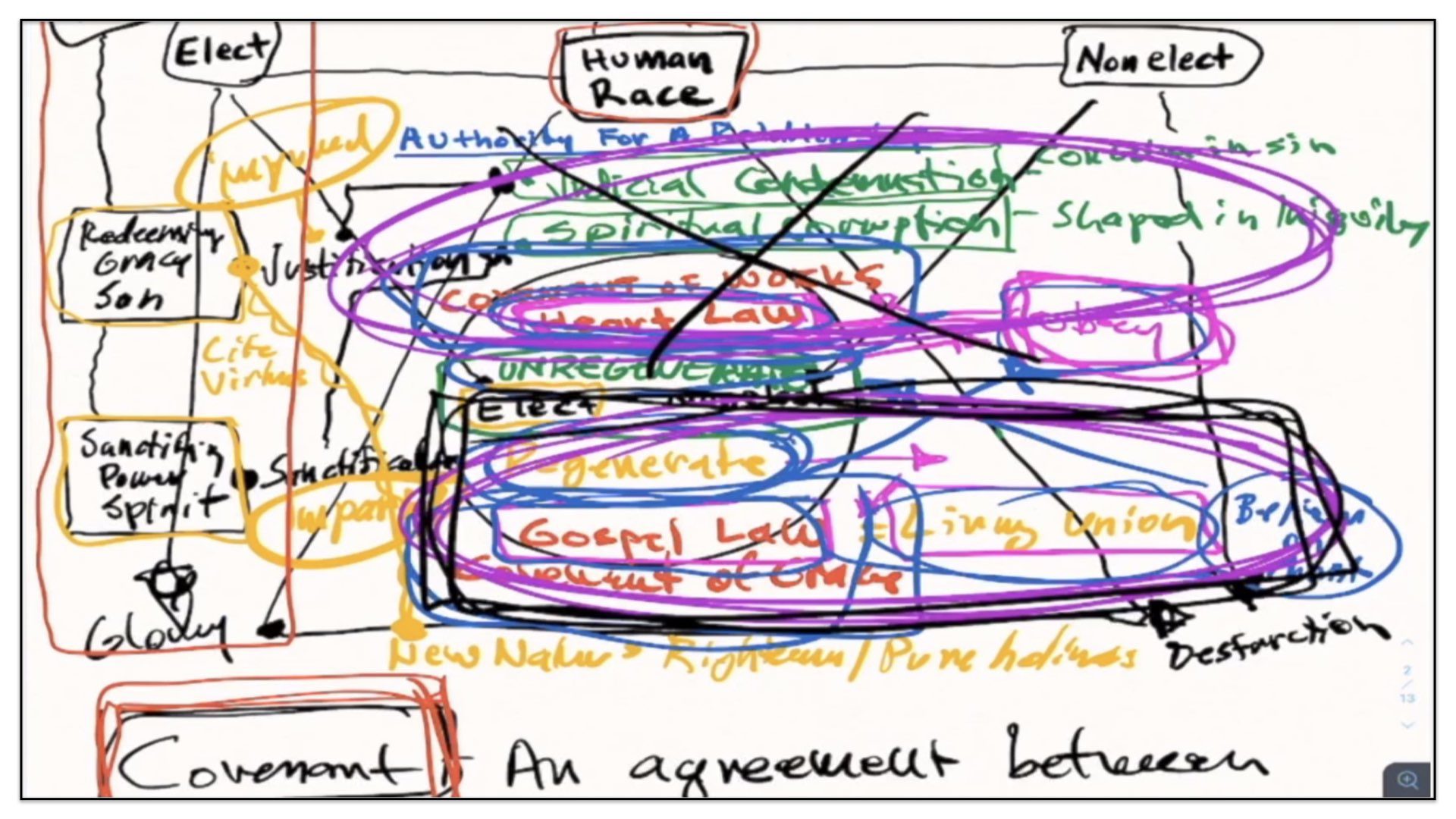
The Apostle Paul says, “Continue in the liberty wherewith Christ has made you free.” That’s the gospel law! “And don’t be entangled again in a yoke of bondage.” That would be the moral law, or the heart law, or any other precept or prohibition that we’re seeking to obey. That’s not our obedience. Christ is our obedience! And that is our liberty in Christ. He is our righteousness.
If We Live In Union With Christ, Let Us Walk In Union With Christ—Galatians 5:22-25
Back to the passage of scripture. In the same chapter, I want to read for you verses 22 through 25. And here we have a very clear reference to the new nature. Let me just mark the verses down—22 through 25. We have a clear reference to the new nature—“But the fruit of the Spirit…”Now you see, the word “Spirit” is capitalized. But that’s not possible to see in the original. That’s left to the translators as an interpretive exercise whether or not it should be capitalized a lowercased. I believe the word in this passage should be lowercased, because the word is not a reference to the Holy Spirit; the word is a reference to our new nature. Remember, in John chapter 3, Jesus said “that which is born of the flesh is flesh, and that which is born of the Spirit is spirit (lowercased). Jesus is referring, in that passage, to the new nature—to our union with Christ. And so Paul is doing the same thing here. By using the word spirit, he’s talking about our union with Christ, or our new nature, created in righteousness and true holiness. The fruit of the new nature, the fruit are the virtues of Christ flowing in us. The fruit, or virtue of Christ flowing in us “is love (that’s the love of Christ), joy, peace, long-suffering, gentleness, goodness, faith, meekness, temperance.” These are all virtues of Christ flowing in us. “Against such there is no law.” Back to the framework.

“Against such there is no law.” There is no other law greater than these virtues flowing into us—our living union in Christ. “Against which there is no law.” Do not be brought back under the yoke of bondage. Back to our text, in verse 24—“And they that are Christ’s have crucified the flesh.” That’s a reference to the old nature, the sinful nature, and the affections and lusts. “If we live in the spirit,” that is, the new nature; if we live or abide in this union with Christ, “let us also walk in this union with Christ.” That is sanctification! What law is it that governs my conduct as a believer? The obedience and righteousness of Christ. His virtues flowing in me. That is what I’m to walk in. That’s the rule of my conduct. It is a living union with Christ. Now I just want to mark down for the notes that what I read for you in Galatians chapter 5, Paul is essentially saying, “Stand fast in this perfect law of liberty; stand fast in it!”
Beware Of Those Who Would Bring You Into Bondage, Under The Yoke Of Another Covenant And Its Law—Galatians 2:4,5
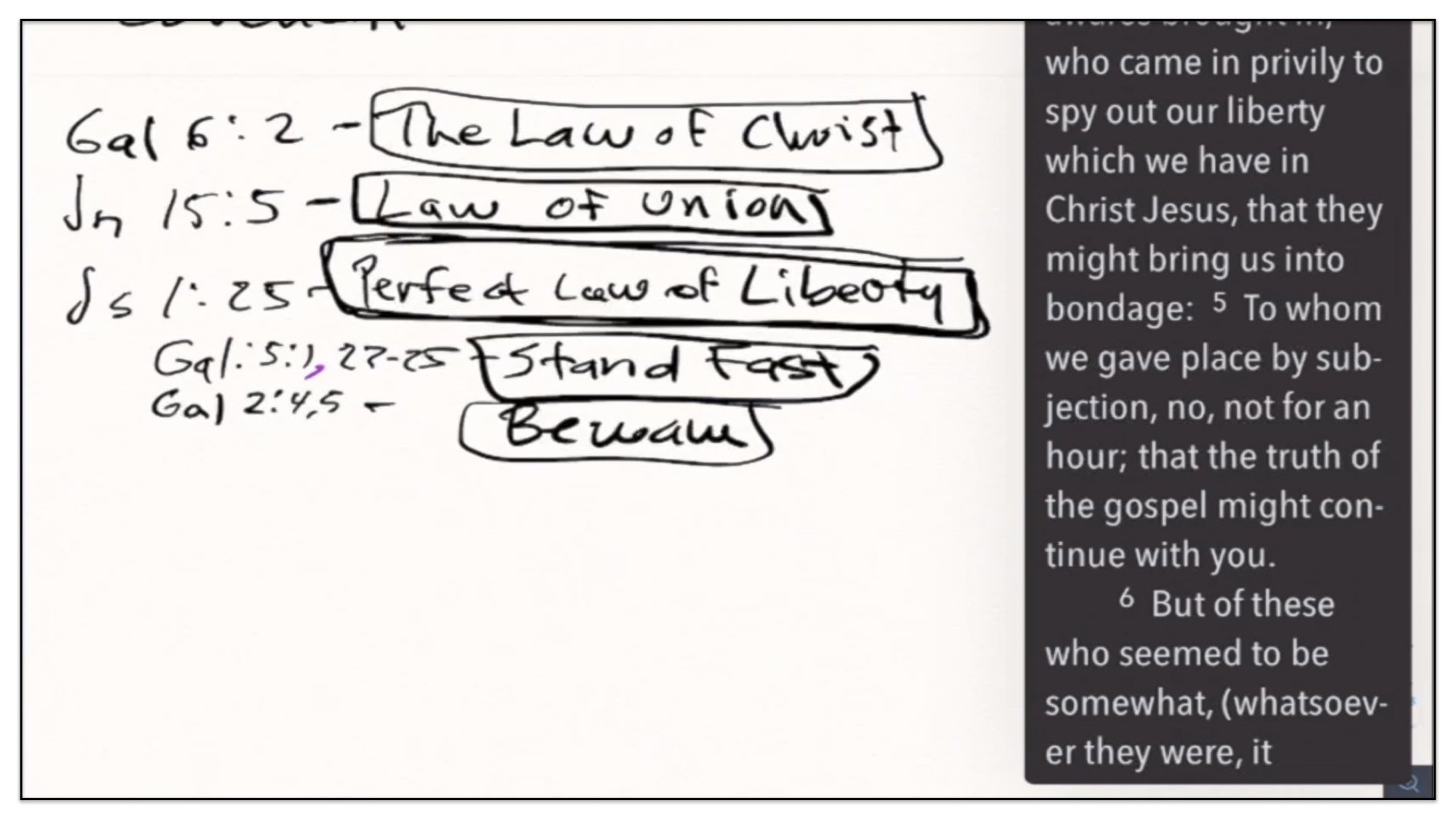
While we’re in Galatians, I think it’s good if we were to turn to the second chapter. I want to read to you a couple of verses, beginning in verse 5. Galatians chapter 2, verses 4 and 5. Paul writes here, watch—“And that because of false brethren unawares brought in, who came in privily to spy out our liberty,”—the same liberty Paul’s been speaking of in Galatians 5; the same liberty James speaks of in the first chapter of his letter; the law of union, the law of Christ, the gospel of Christ, our union with Christ—certain people came in to spy out our liberty “which we have in Christ Jesus, that they might bring us into bondage.” Back to the framework.
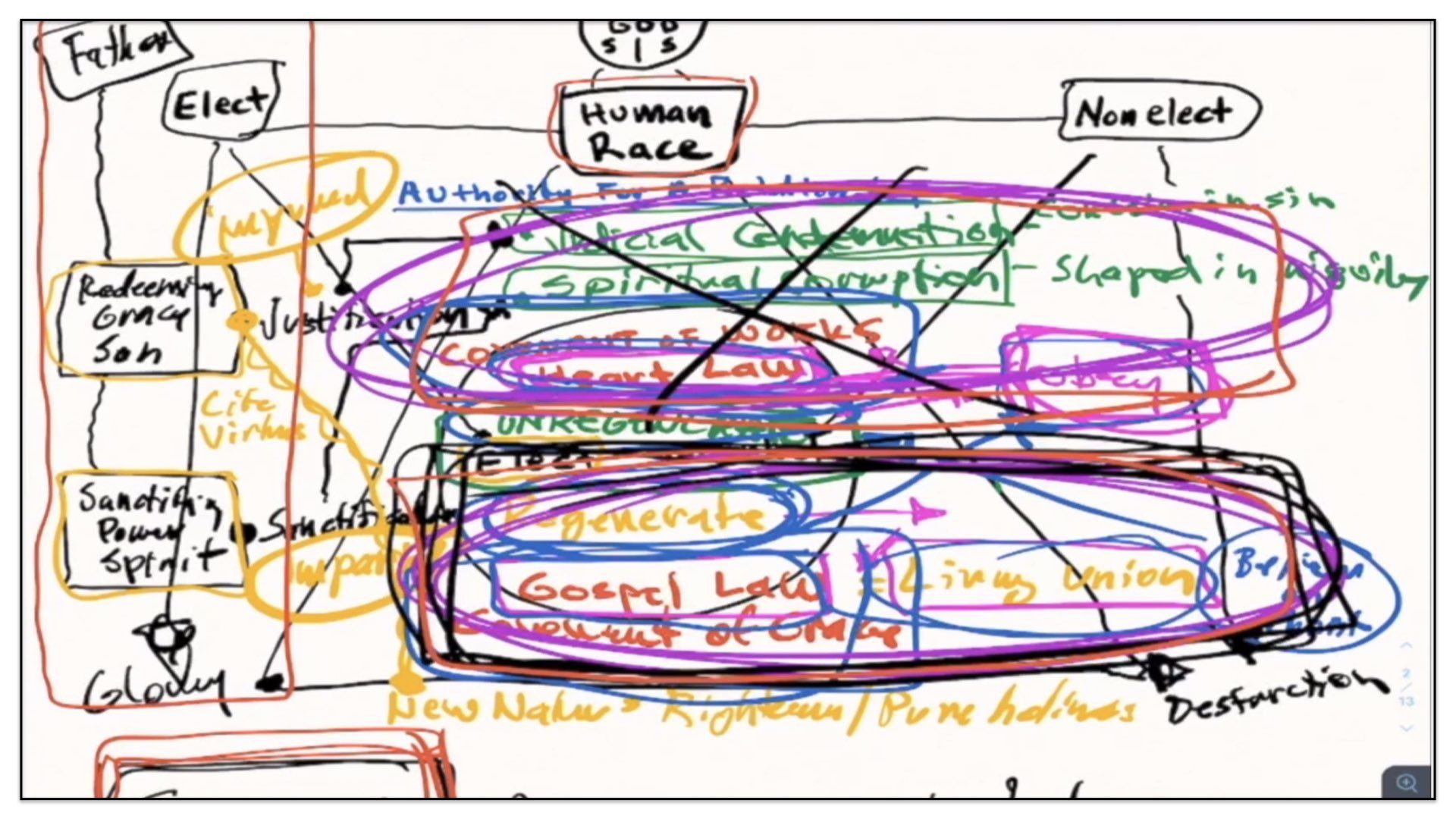
That they might do what? They’re spying out our liberty in Christ—I’ll just change the color pen—they’re spying out our liberty in Christ, that they might bring us again into bondage; that we might be obedient to the moral law or to the heart law. That’s what Paul is saying isn’t he? But watch, “to whom we gave place by subjection, no, not for an hour; that the truth of the gospel might continue with you.” Paul says, the truth of the gospel is your union with Christ, the gospel law. It’s not to be yoked to bondage again with the covenant of works. For that matter, any other covenant than that of grace. So in other words, in Galatians chapter 2, Paul is basically saying, beware of those that would bring you under yoke of bondage. So this is the perfect law of liberty—stand fast in it and beware of those that would lead you under a yoke of bondage.
The Law Of Faith—Romans 3:27
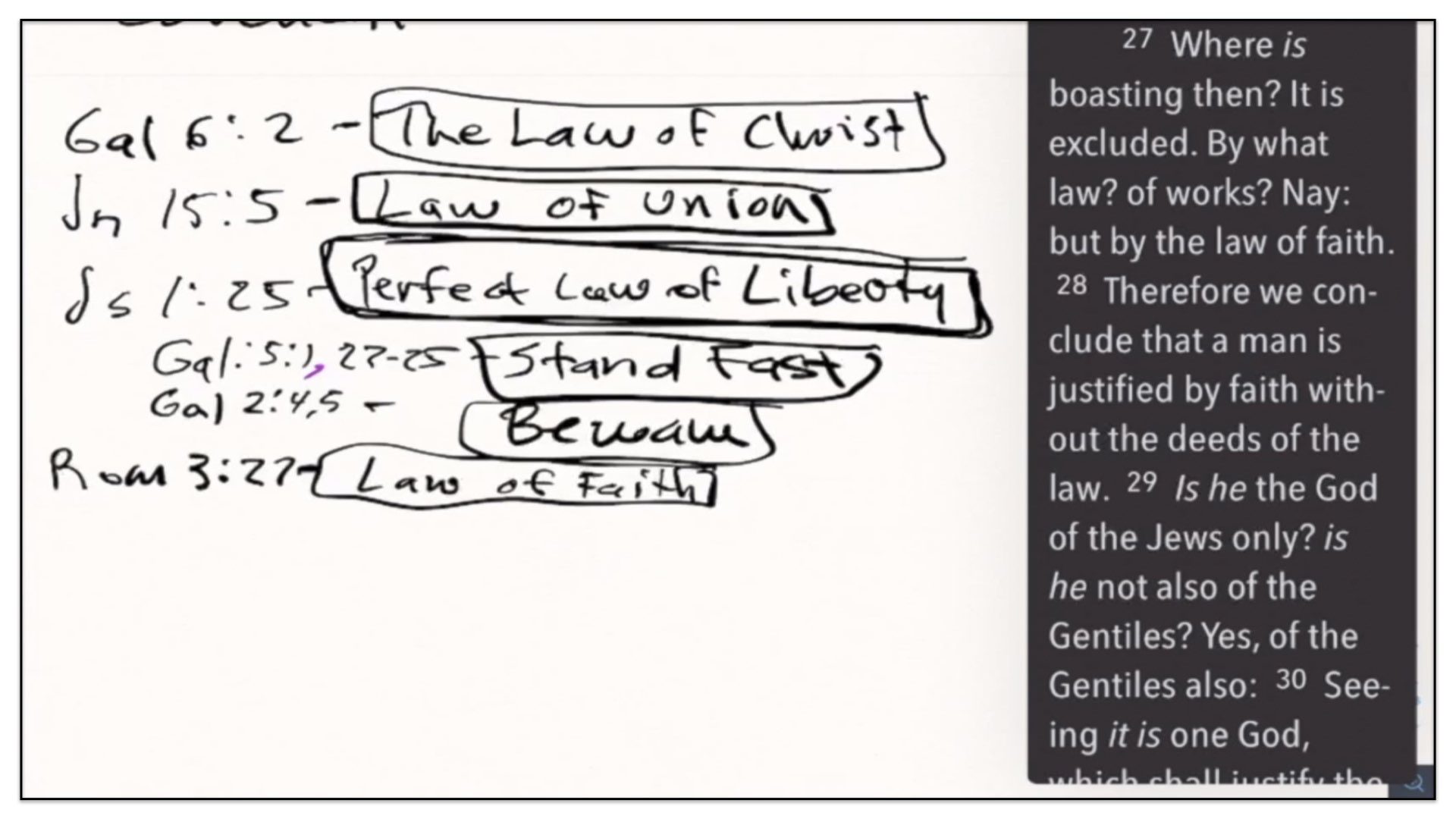
Okay. So let’s come to another passage of scripture, another example based on what I’ve just read for you from Galatians chapter 5. Another scripture comes readily to mind and this is Romans chapter 3. Romans chapter 3. And I want to read for you just verse 27—“Where is boasting then? It is excluded. By what law? of works? Nay: but by the law of faith.” We now have a new label. This is called the law of faith. The law of faith is the same as the law of Christ, the law of union, the perfect law of liberty, the gospel law. It’s our union with Christ. Where does faith come from? Why is it called a law of faith? Many times you’ll hear Reformed believers tell you that faith is a gift from God. That’s true! But they don’t explain how, do they? They leave the impression that somehow God just floats it down from heaven and it falls into your soul. Doesn’t happen that way, my dear friends. Faith belongs to Christ. It’s Christ’s faith. And we receive that faith as a gift, when the Spirit of God unites our souls with Christ. Then the faith of Christ flows in us. And that is what we call saving faith. And that’s why this gospel law is also called the law of faith, the law of this virtue of Christ that flows in us. It’s the gospel law, our union with Christ.
The Law Of The Spirit Of Life In Christ—Romans 8:1-4

Here’s another scripture I would like us to consider. Romans again, chapter 8, verses 1 through 4. Now, before I read the passage, here we have again another reference to the word “spirit”. You’ll notice from verses—well, you’ll notice through the whole chapter really—the word “spirit” is capitalized. I’m not sure it’s capitalized every time it’s used, but for most of the time it’s used, it is capitalized. I believe from verses—is it from verses 1 through 15; see, I studied this passage many years ago; I think it’s from verses 1 through 15—the word “spirit” should be lowercase. It’s not a reference to the Holy Spirit. It’s a reference to our new nature in Christ. It’s a reference to the gospel law, to our union with Christ. Remember, the new nature is created in righteousness and true holiness. And it’s created in righteousness and holiness because it’s a union with Christ—Christ’s righteousness is imparted to us. We’re entirely righteous, completely holy, within the capacity of our new nature. And that’s what the word “spirit”, when it’s lowercased, often refers to in the New Testament. And that’s what we have here. Watch, if you read verses 1 through 4 with the word “spirit” lowercased, watch what we have—the gospel law. ”There is therefore now no condemnation to them which are in Christ Jesus,” so, we are united to Christ. “Who walk,” it’s talking about our conduct as believers after we’ve been born again. What’s our rule of conduct? We’re united to Christ, the gospel law. We’re walking “not after the flesh,” the old nature, “but after the spirit,” the new nature. “For the law of the spirit of life in Christ Jesus…”, I’m going to stop there and just mark down those words. Here we have a new label. It’s called “the law of the spirit of life in Christ”. Remember, the word spirit is a reference to the new nature, which is our union with Christ. Read that verse with that in mind, for the law of the new nature of life. Remember what happens when the soul is united to Christ. The life of Christ flows into our souls and we’re made alive unto God through Christ. That’s it! For the law of the new nature of life in our union with Christ Jesus. That’s the gospel law, my dear friends. And what has it done? “It hath made me free,” it’s liberated me, “from the law of sin and death. For what the law could not do, in that it was weak through the flesh,” what the heart law could not do under the covenant of works, for it was weak through my sinful corrupt nature, “God sending his own Son in the likeness of sinful flesh, and for sin, condemned sin in the flesh: that the righteousness of the law might be fulfilled in us,” the righteousness of the heart law, under the covenant of works, because Christ obeyed it; that has now been fulfilled in us, by the obedience of Christ. “Who (therefore now) walk not after the flesh (the old nature, under the covenant of works), but after the spirit (the new nature, under the covenant of grace and through our union with Christ, His righteousness imparted to our souls).” This passage goes on dealing with the same topic, but I’ll just stop the reading there. It’s good enough to show you, as an example, what I mean when I talk about the gospel law as our union with Christ.
The Law Of God After The Inward Man—Romans 7:21-25
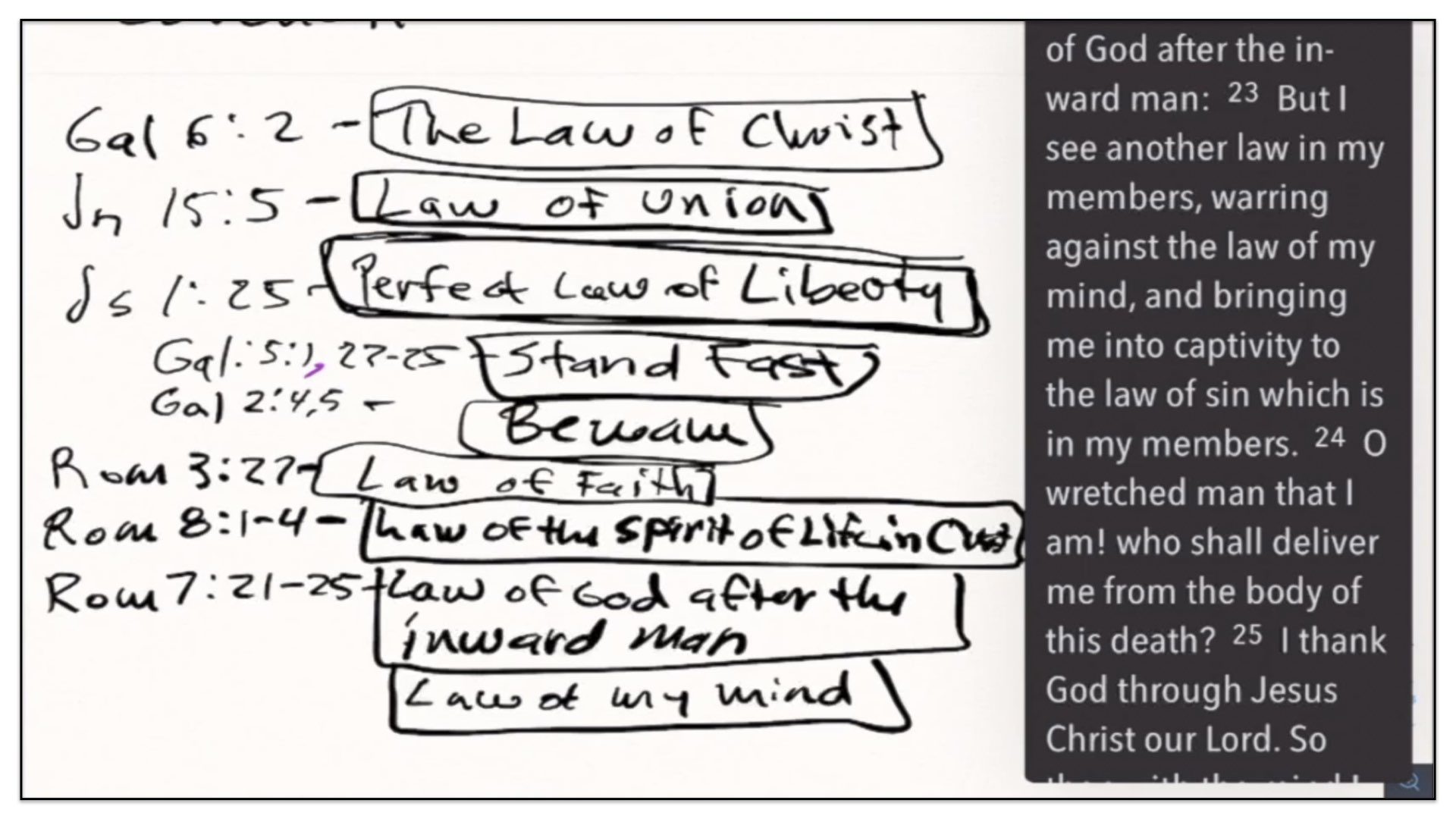
Let me give you another example. I’m still in the book of Romans. Let’s look at Romans chapter 7 and we’re looking in verses 21 through 25. Romans chapter 7 and verse 21. The Apostle Paul writes—”I find then a law, that, when I would do good, evil is present with me. For I delight in the law of God after the inward man:” I pause there to mark down the new label. What’s it called? It’s called “the law of God after the inward man”. What is this reference to an inward man? The inward man is another description of the new nature. The words spirit, new nature and inward man—It’s referring to the same thing, our union with Christ. So here we have the law of God after what? After our union with Christ. It’s a gospel law. It’s the law of Christ. It’s the law of union. It’s the perfect law of liberty. It’s the law of faith. It’s the law of the spirit of life in Christ. It’s the law of God after the inward man. Look in verse 23, “But I see another law in my members, warring against the law of my mind…” Here’s another one—it’s called “the law of my mind.” It’s referring to the gospel law again, but by a different label. See, look at it again in verse 23, “But I see another law in my members, warring against the law of my mind…” there’s two laws here. There is a law of the flesh and there is a law of the new nature; a law of my corrupt heart, and the law of my union with Christ; and these two natures are pitted against each other. The two natures are in a constant warfare. And that’s why Paul says it brings “me into captivity to the law of sin which is in my members.” In other words, Paul says, I cannot do the things that I would, but I do the things I wouldn’t do, because of the flesh the spirit that’s striving against each other. Therefore exclaims, “O wretched man that I am! who shall deliver me from the body of this death?” I want the corruptions of sin to be gone forever! And then, in verse 25, “I thank God through Jesus Christ our Lord,” because of His obedience and righteousness imparted to me. Notice, Paul doesn’t say, “I thank God through my obedience to the heart law. Or, I thank God through my obedience to the moral law. But rather, “I thank God through the Lord Jesus Christ,” meaning His obedience and righteousness imputed to me in justification and imparted to me in sanctification. “So then with the mind I myself serve the law of God,” that’s a reference to one’s union with Christ. “But with the flesh (or old nature) the law of sin.”
The Gospel Law Of The Covenant Of Grace—Romans 6:11-22
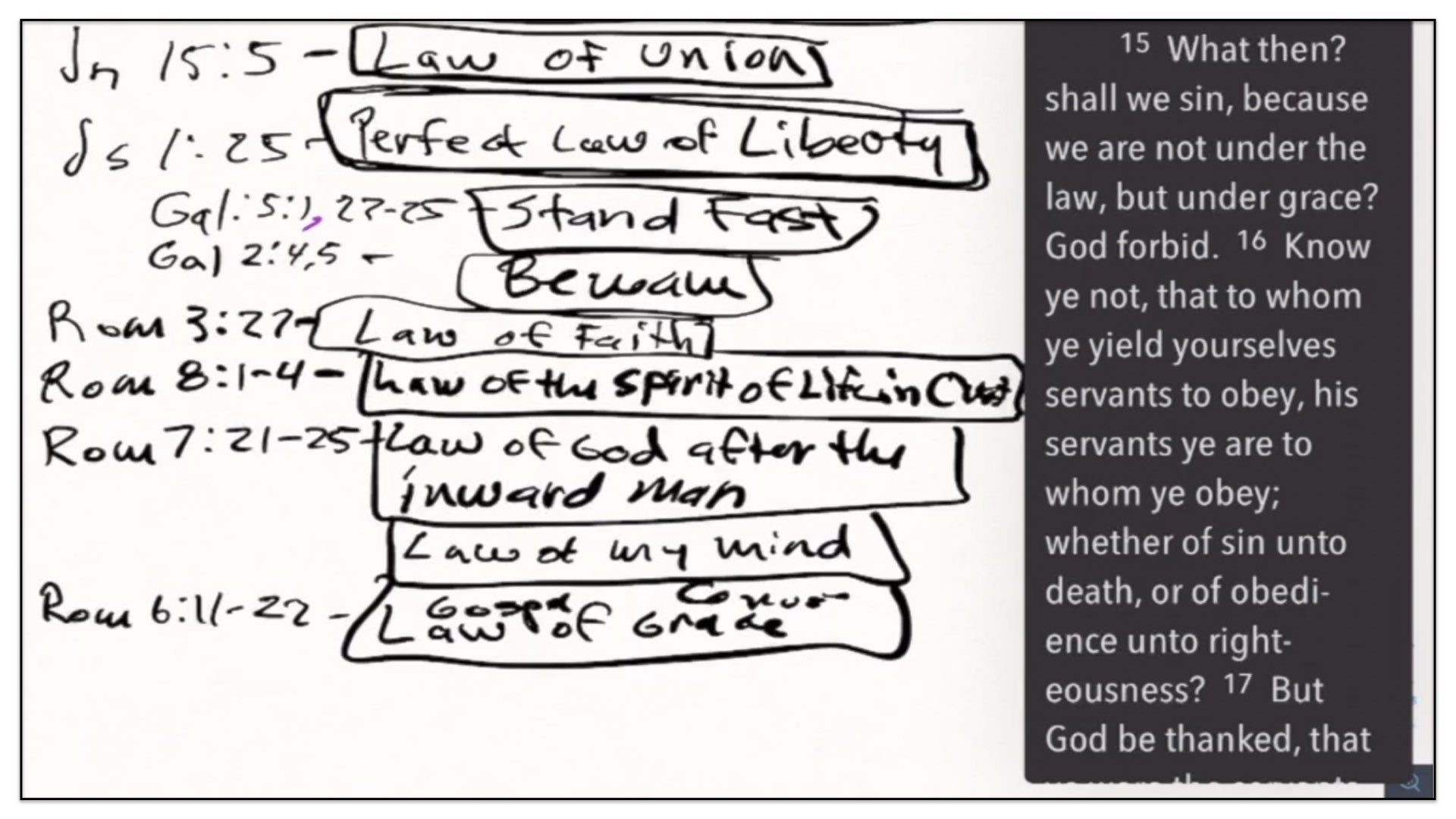
Here’s another passage. I’ve only got a two more examples to give to you, still in the book of Romans. I would like now to look in Romans chapter 6. And I want to begin reading for you in verse 11, and I’m gonna read down to verse 22. It’s a more lengthy reading and I’ll just make a few comments as we go along. Watch. “Likewise, reckon ye also yourselves to be dead indeed unto sin,” that’s a reference to our old corrupt nature, “but alive unto God through Jesus Christ our Lord,” that’s a reference to our new nature in Christ. So here we have two natures being referenced by Paul. Verse 12, “Let not sin therefore reign in your mortal body…” As a believer in Christ, what is it that governs your conduct? Well, Paul says, you don’t have a license to disobey. You don’t have a license to sin. Don’t let sin reign, dominate, in your mortal body, in the body that you continue to have in this world, “that ye should obey it in the lusts thereof. Neither yield ye your members,” that’s the members of your body—your hands, your feet, your eyes, your ears, your thoughts. Don’t yield the members of your body “as instruments of unrighteousness unto sin: but yield yourselves unto God, as those that are alive from the dead.” Where does that life come from? Our union with Christ. We were dead in trespasses and sins, but because of the new birth, the Spirit of God uniting us to Christ, the life of Christ flows in us. We are alive from the dead because of our union with Christ, and yield “your members as instruments of righteousness unto God.” Meaning, within the capacity of your new nature, the virtues of Christ are flowing through you, so express those virtues in the things that you think, and the things that you say, and the things that you do, “For sin shall not have dominion over you: for ye are not under the law.” You’re not under the moral law. You’re not under the covenant of works. You are now “under (the covenant of) grace.” You’re under the law—this, put it in here—you’re under the law of grace, the gospel law of the covenant of grace. It’s what Paul teaches here, is it not? Verse 15, “What then? Shall we sin, because we are not under the law, but under grace?” My dear friends, see, the views I take on the gospel law, many people call me an Antinomian, because I reject the moral law or the heart law as rules of conduct for the Christian life. They therefore accuse me of not believing in a law. And therefore, they say, “Well I believe we can live any way we want and the grace of God is going to reign supreme anyway.” That is a false allegation. Those people are saying the same things that Paul is bringing out here. Shall we sin? Because we’re not under the moral law or the heart law, but under the gospel law, under the covenant of grace? Paul answers it. He says, Don’t call me an Antinomian; don’t accuse me of making a license for sin. “God forbid. Know ye not, that to whom ye yield yourselves servants to obey, his servants ye are to whom ye obey; whether of sin unto death,” the old nature, “or of obedience unto righteousness,” this is a reference to the obedience and righteousness of Christ flowing in us, and working itself out from us. The Spirit of God working in us both to will and to do of His good pleasure—the Spirit of God working the virtues of Christ in us and whatever obedience we have is ultimately based on the virtues of Christ flowing through us and coming out of us. “But God be thanked, that ye were the servants of sin,” when you were under the covenant of works and subject to the heart law, “But ye have obeyed from the heart,” through your union with Christ, the new nature, “That form of doctrine (teaching) which was delivered you. Being then made free from sin,” from the covenant of works and the heart law and the old nature, “Ye became the servants of righteousness.” The obedience and righteousness of Christ. You’re not a servant to your own righteousness. That’s legalism. You’re a servant to the obedience and righteousness of Christ. That’s what makes you free. That’s the irony here. We are liberated by our union with Christ, but in so being, we are servants to Christ. We’re liberated by our having been made servants or slaves to the obedience and righteousness of Christ. “I speak after the manner of men because of the infirmity (or weakness) of your flesh: for as ye have yielded your members servants to uncleanness and to iniquity unto iniquity,” in the capacity of the old sinful nature, “Even so now yield your members,” your hands, your eyes, your ears, your body, your mind—yield the members of your body “servants to righteousness unto holiness.” Our souls, the new nature of our soul, is created in righteousness and true holiness. That’s Ephesians chapter 4 and that’s why we yield the members of our body to be servants in the capacity of this new nature—the virtues of Christ flowing in us. Verse 20, “For when ye were the servants of sin, ye were free from righteousness,” from the righteousness of Christ. You were bound and under the yoke of your own self-righteousness. “What fruit had ye then in those things whereof ye are now ashamed? For the end of those things is death.” Nothing you could do under the covenant of works and obeying the heart law brought anything fruitful, anything worthy, anything of value to God. It didn’t bring anything valuable to God before you were born again. What makes you think it’s gonna bring anything of value to God after you’re born again? No, no, listen, verse 22, “But now being made free from sin,” from that old nature, from the covenant of works, from the heart law, you “become servants to God, ye have your fruit unto holiness,” the virtues of Christ flowing through your righteous and holy new nature, your soul, “and the end everlasting life.” Now, stop the reading there. That, my dear friends, is the gospel law, under the covenant of grace.
The Yoke Of Christ—Matthew 11:28-30
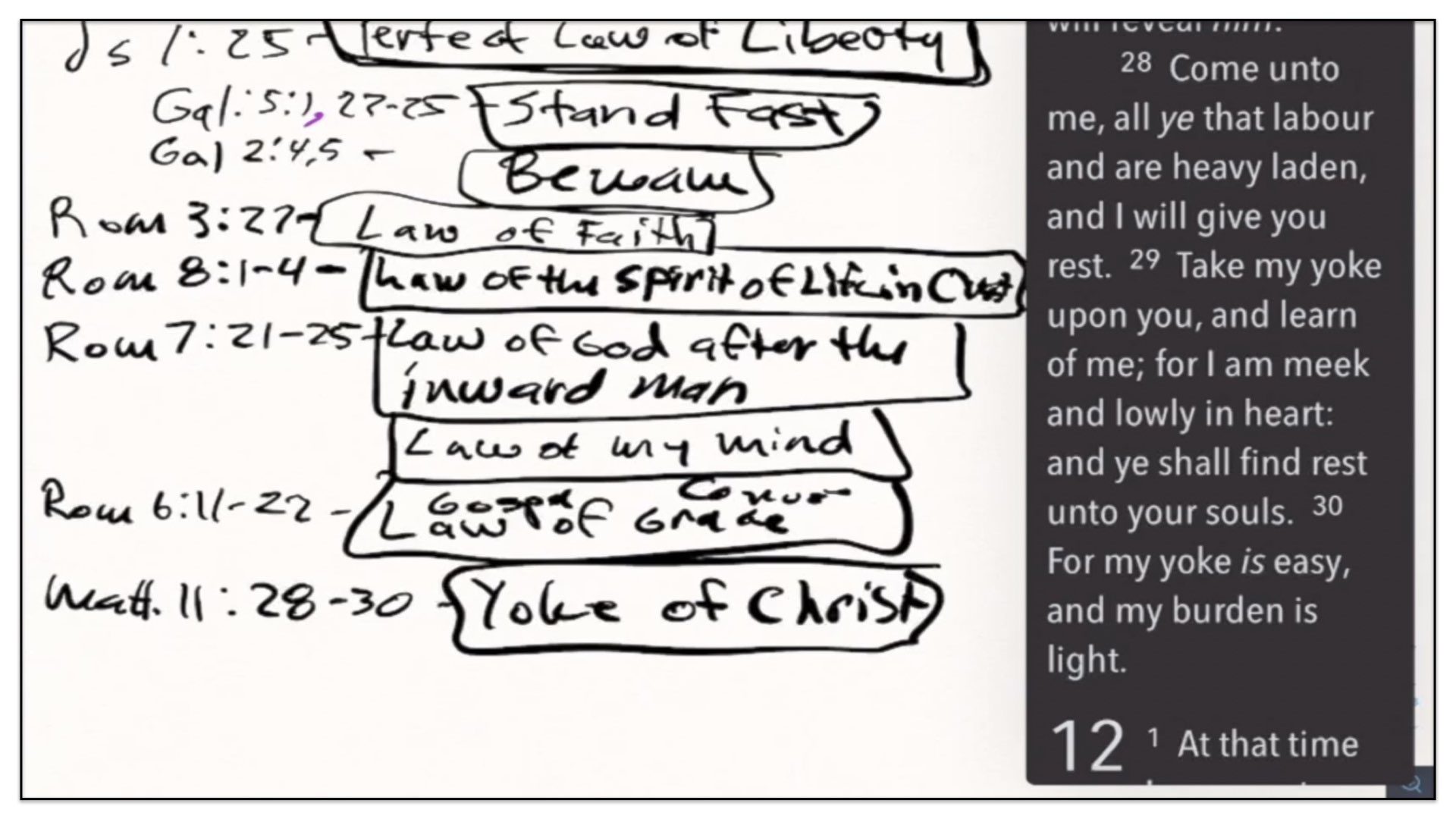
Well, I know our time. Once again, I think I’m reaching close to it, if not violating the hour marker, but I’ve got one more passage of scripture I want to share with you, and this one is found in Matthew Chapter 11. Matthew chapter 11, and what I’d like to do is read to you the words of the Lord Jesus Christ. In Matthew chapter 11 and verse 28. The Lord Jesus said, ”Come unto me, all ye that labour and are heavy laden, and I will give you rest.” If I just take you back up for a moment to look at the Framework of Sovereign Grace. Understand what it is the Lord Jesus Christ is here teaching.
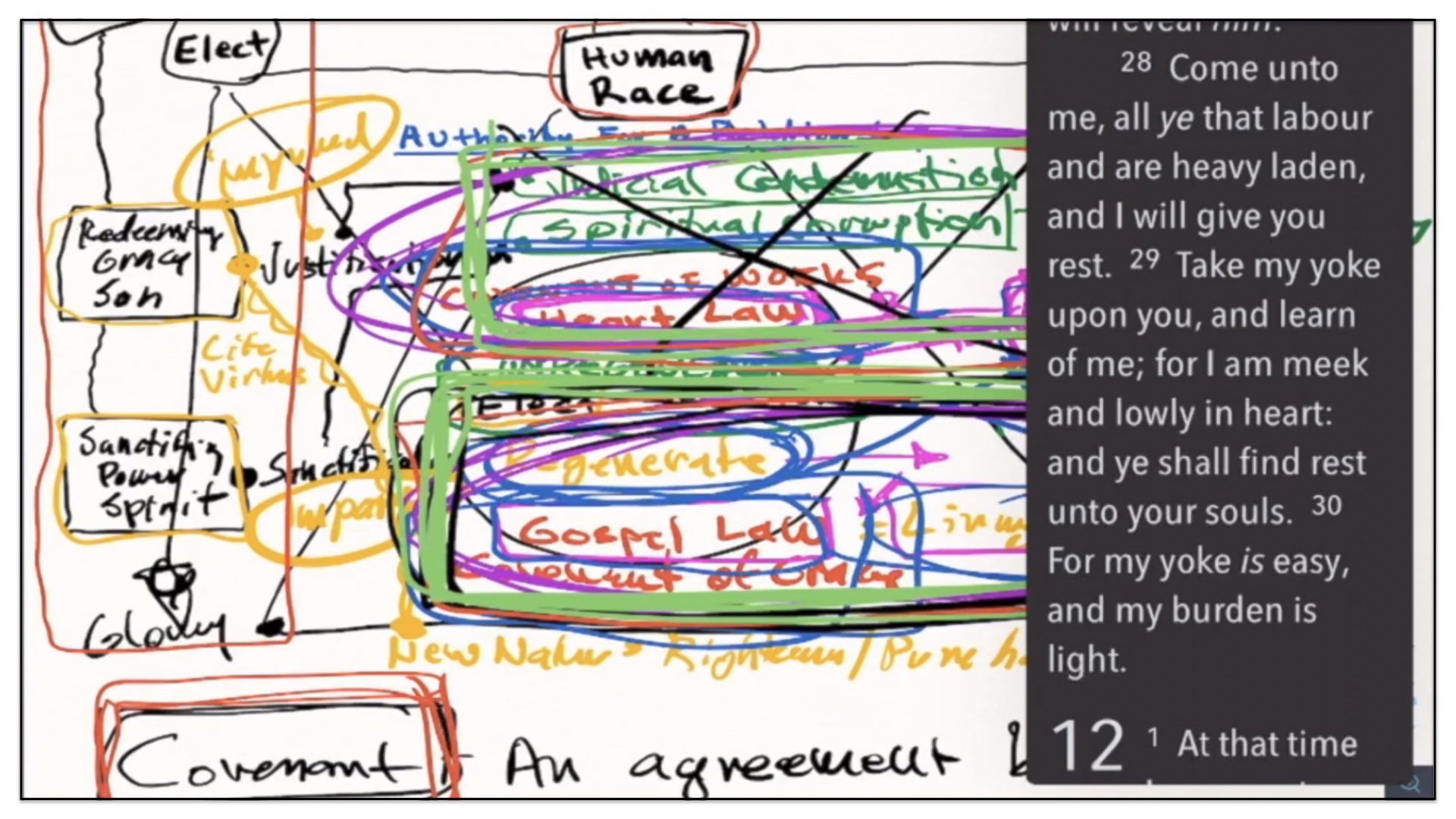
Let me choose a different color. Hopefully you can see it if I choose that color. The Lord Jesus Christ is referring in this text to those who have been regenerated by the Spirit of God. That’s the invitation He’s giving, it’s to them. And it’s these people who have been made sensible of their sins. These are the people who see the folly of trying to make themselves right with God by keeping the heart law under the covenant of works; these are the people that are laboring; they’re working in their self-righteousness to earn favor with God; they’re heavy laden. They’re heavy—look at the language—they labor, they’re working hard in their self-righteousness by keeping the heart law. They’re heavy laden. They’re full of burdens, guilt of their sins, and transgressions. And what does Jesus say? He doesn’t say to them, Go to the moral law, go to the heart law to find rest to your soul. No, He says to His regenerate people, Come to Me. Come to Me. He says, “Take my yoke upon you.” I’m gonna write it down—the yoke of Christ, another label for the gospel law. The yoke of Christ. Jesus says, “Take my yoke upon you, and learn of me.” We learn of Christ only because we’re in union with Christ. We have the mind of Christ because our souls are united with Him. The mind of Christ flows through us, with these other virtues. He says, “Take my yoke upon you,”meaning, you are in union with Me; you’re yoked to Me; take My yoke upon you; lean upon Me,” is what Jesus is saying. Walk with Me in your sanctification. Learn of Me, live out the virtues that are flowing through you, “for I am meek and lowly in heart.” And if you do this, says Jesus, If you live according to the gospel law, according to this living union you have with Me, you’ll “find rest unto your soul.” Why? Because this is a law of liberty! He says, “My yoke,” this gospel law, this living union you have with Me, “is easy, and” the burden you carry on being yoked to Me is light; it’s not heavy. In other words, when you go to exercise those works of righteousness, things such as saving faith, obedience, and the different manifestations of it as you walk with the lord, it’s not a burden. It’s a great joy. When the people of God say, Come, let us go into the house of the Lord and worship Him together on the Lord’s day, we rejoice and we’re glad in our hearts and we say, Yes, I’ll come. And, we say that, not out of an obligation to obey some law in order to maintain favor with God. No, we do it because God’s favor is in us already. Because the Lord Jesus Christ’s virtues are flowing through us and it’s the gladness of Christ in our hearts that boils up within us, and then we’re glad to join with God’s people on attending corporate worship on a Sunday. It’s a gladness that comes from Christ. The same is true for love. When we have opportunities of loving one another, this is a love that comes from Christ through us, expressed in works of love or charity towards others. All of the virtues of Christ will express themselves in some concrete way of obedience. And that’s what makes obedience or good works light and easy for a believer. Because it’s coming directly from Christ, the Spirit of God working them in us and then we working those things out naturally in fear and trembling. The gospel law!
A Final Word
Can I therefore show you my dear friends? We started in Galatians Chapter 2, or chapter 6 and verse 2. It’s called “the law of Christ.” In John chapter 15, it’s “the law of union”. In James chapter 1, it’s “the perfect law of liberty”. In Galatians chapter 5, Paul says “stand fast in that liberty”. And in Galatians Chapter 2, he says, “beware lest somebody tries to come and bring you back under the yoke of bondage.” In Romans chapter 3, it’s called “the law of faith” by virtue of faith from Christ flowing into us. In Romans chapter 8, it’s called “the law of the spirit of life in Christ”. In Romans chapter 7, it’s called “the law of God after the inward man”, it’s called “the law of my mind”. In Romans chapter 6, it’s called “the gospel law and the covenant of grace”. And in Matthew chapter 11, Jesus calls it “the yoke of Christ”, His yoke upon us, or our union with Him. And this is what I call, “the gospel law”. That’s it, my dear friends.
What’s the meaning of the gospel law? It is our union with Christ by virtue of which His life and virtues flow into us, the Spirit of God working that in us both to will and to do of His good pleasure. And then we working that out from us in fear and trembling, through good works and obedience. But, you see, those good works and obedience are not our obedience, but rather, the virtues of Christ flowing through us. It’s all of Christ. And then the nature of our union with Christ is created in righteousness and true holiness, meaning, it’s perfectly righteous and truly holy. There’s no measurements of that. It’s absolutely holy and righteous. That’s why we say, in sanctification, we walk with Christ in His obedience and His righteousness; not our obedience, not our righteousness. My dear friends, you’re not seeking to grow in holiness. You’re not trying to live a legalistic life; trying to be better and better every day, to impress other people or to impress God. I know you say that’s not why I do it. But if you’re honest with yourself, my dear friend, honest between you and the Lord, it is why you do it. You are doing these good things in order that you might earn that favor with God to keep the moral law, to keep the heart law, to live by the precepts and the prohibitions of Christ in the New Testament. You’re bringing yourself under the yoke of bondage. What you need to do is come to Christ to find rest to your soul. And then, walk in the liberty of Christ where He has made you free—His obedience and His righteousness.
That’s my teachings for you, and I can only hope the Lord is going to bless these truths to your heart. I don’t know. Maybe you still aren’t convinced—the gospel law is the rule of conduct for the believer’s life. But I hope there’s been sufficient things to bring out to you that’s challenged the way that you understand these teachings, or your own teachings. And then, for those of you that do agree with these teachings, well, I hope it’s been an affirmation to your faith and I hope that you go out this week and you’ll find that fullness of Christ and live out your life in Him, with joy, thanksgiving, peace in your hearts.
I want to wish upon you every blessing in the Lord. And you know, next time we come together, I’m tempted to bring one more set of teachings on this topic. I’m thinking in particular of the other covenants mentioned in scripture and what we do with them. And how those tie in with the covenant of works and the covenant of grace. I think that would be beneficial to you, if we were to look at that subject. So I may do that the next time we meet. That’ll be three studies on this particular topic. Well, until we meet again next week, I do wish upon you the blessings of the Lord.
Jared Smith served twenty years as pastor of a Strict and Particular Baptist church in Kensington (London, England). He now serves as an Evangelist in the Philippines, preaching the gospel, organizing churches and training gospel preachers.
Jared Smith's Online Worship Services
Jared Smith's Sermons
Jared Smith on the Gospel Message
Jared Smith on the Biblical Covenants
Jared Smith on the Gospel Law
Jared Smith on Bible Doctrine
Jared Smith on Bible Reading
Jared Smith's Hymn Studies
Jared Smith on Eldership
Jared Smith's Studies In Genesis
Jared Smith's Studies in Romans
Jared Smith on Various Issues
Jared Smith, Covenant Baptist Church, Philippines
Jared Smith's Maternal Ancestry (Complete)




